Archived Commercial Blog Posts
Commercial Fire Damage in Winter Park, FL
6/13/2022 (Permalink)
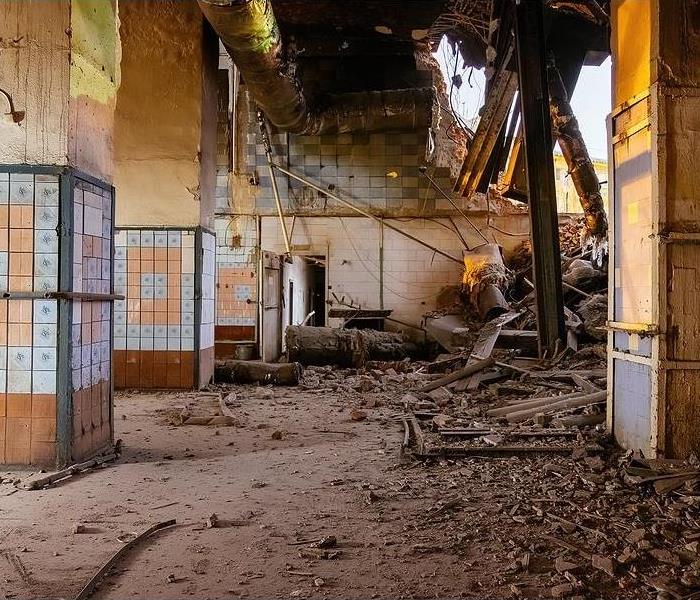 Here you can see the destruction caused by a large commercial fire. With this extent of damage, it is extremely important you hire an expert company.
Here you can see the destruction caused by a large commercial fire. With this extent of damage, it is extremely important you hire an expert company.
Commercial fire damage includes more than just the visible smoke, flames, and water that can be seen in the aftermath of a fire. It can also cover other unseen damages to commercial spaces. These include structural damages and hidden items like fingerprints, blood drops, chemical smears, and paint chips from mishandled materials. The time it takes for a fire to be extinguished and the extent of water damage depend on the type of fire. Here are the steps for fire restoration in Winter Park.
1. Assessment
You should be able to notice the extent of fire damage by examining the surrounding premises. This will help you in identifying what was burnt on an area covered with smoke, flames, and water. The location of the fire might also be noticed by looking at the marks left behind on walls and furnishings.
2. Safety Work
You should do fire damage restoration work so that it won’t cause additional injuries or damage. It is essential to use fire-safe materials while restoring the commercial space, especially those items that can easily catch fire. For instance, you should avoid cardboard. Instead, you should use a material like mineral wool or cellulose, which are fire-resistant. They help prevent fire from spreading around.
3. Water Removal
The removal of excess water can be a challenging task. It depends on the amount of water used to extinguish the fire and how long it took to extinguish it. If possible, let fire restoration services do this for you.
Whether you decide to do this by yourself or have professionals help you, make sure you use safety measures. This includes wearing protective equipment like rubber gloves and goggles. You should avoid the use of heavy machinery and harsh chemicals.
4. Soot and Smoke Removal
Once the fire is under control, you will be faced with getting rid of the soot, smoke, and chemicals used to extinguish the fire. You should do this manually as it is more time-consuming. This is when professional fire restoration services can help. The use of powerful vacuum cleaners and dehumidifiers can help remove these substances from your commercial spaces.
5. Cleanup
Get rid of any materials, furniture, appliances, and stains that might have been exposed in the fire. Use air movers to remove the soot and smoke from walls and skylights. Fill up all cracks and crevices with chemical foam to prevent staining and water damage in the future.
6. Restoration and Repair
After the cleanup, you can start with the restoration and repair process. Contact a fire damage restoration company in Winter Park to help you with this step. This will help restore your commercial spaces to their normal state before the fire.
As you can see, the restoration of commercial space is not just about the present state of the affected areas. It may also require planning and preparation before starting the cleaning and restoration process. It involves assessing your commercial spaces to determine what was damaged by fire, whether in-situ or out-of-place materials. In some cases, fire damage could be very severe, causing serious structural damage to buildings. In this case, you might require recovery services from SERVPRO in Winter Park, FL.
Water Damage in Vacant Buildings
5/31/2022 (Permalink)
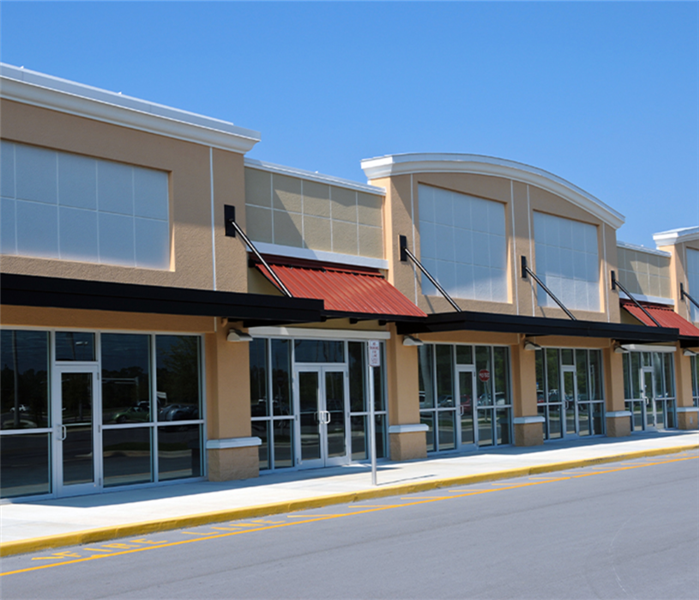 The worst thing about water damage in vacant buildings is that no one is around to notice the problem immediately after it occurs.
The worst thing about water damage in vacant buildings is that no one is around to notice the problem immediately after it occurs.
The worst thing about water damage in vacant buildings is that no one is around to notice the problem immediately after it occurs. The damage can start as a minor leak and later affect property worth hundreds or thousands of dollars. The water will then cause molds on the walls and floors, damaging the property further. If you have an unoccupied commercial property, you shouldn’t lock it up and stay for months without checking on it. Consider routine checks and maintenance to minimize or prevent property damage.
Causes of Water Damage in Vacant Commercial Property
1. Broken or Damaged Windows
Water damage in most commercial buildings happens because of windows with damaged seals. They allow moisture to get into the building and cause more problems such as warped wood and mold development. Property owners should reseal all windows regularly since the join-up can break down after some time.
2. Leaking Pipes
Several reasons can cause pipes breakages, such as damage to the water supply and drainage system, increase in pressure, and cold weather. Some of the signs of damaged pipes include having loose or cracking tiles, watermarks on the floors and walls, walls that have puffed out, and a stuffy smell. Since it may be difficult to detect leaking pipes, you should hire a specialist who will use a piece of special equipment to confirm the leakage.
3. Clogged Gutters
If you don’t clean gutters regularly, they may become clogged and cause water leakage into the building through the foundation or roof. One sign that can show the possibility of leakage in the foundation is wet frames and water puddles. Unfunctional drainage systems may also cause water damage to the foundation of your commercial property.
4. Leaking Roofs
A leaking roof can cause mold build-up, ceiling damage, and shortened electrical wires, which may cause fire, among others. Heavy rains and snowing and incorrect removal of ice are some causes of roof damage.
5. Problems with the HVAC System
After using the HVAC system for some time, its ducts become damaged due to wearing out and causing leakage. Hence, you should clean your HVAC system regularly and remove all the water left on the reservoirs to prevent damage.
6. Clogging in the Sewer System
Contact a water damage restoration expert to rectify the system if you notice sewer damage signs such as a trickling sound. That is because sewer water consists of bacteria that cause infections and illnesses.
7. Leaks in the Sprinkler System
The other cause of water damage in commercial properties is sprinkler system leakages. You can tell your sprinkler system is leaking by noticing wetness on surfaces, mold, and standing water. Ensure to inspect your sprinkler system regularly to check for leaks and moisture and repair whenever necessary.
Water damage in commercial buildings is a problem that property owners should address immediately to avoid further problems. The above are the main causes of water damage that you should be keen to check periodically. However, you can prevent water damage by having a flood monitoring system, ensuring your property is against flood damage, and conducting regular inspections and maintenance on your property.
Reconstruction: Getting Back to Business
5/31/2022 (Permalink)
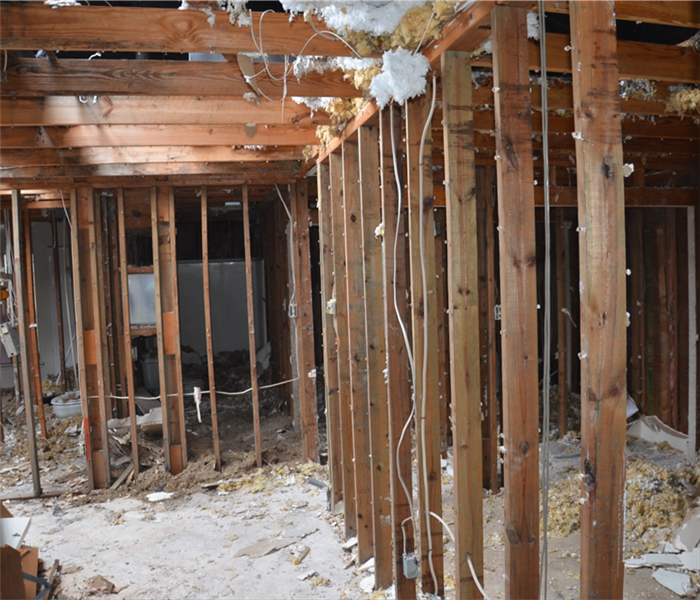 The SERVPRO team can offer assistance with rebuilding and re-equipping your facility.
The SERVPRO team can offer assistance with rebuilding and re-equipping your facility.
Many people believe that it is impossible to restore a business after fire, water, or mold damage. Rest assured that with the help of SERVPRO of Winter Park, you can have peace of mind knowing that they will restore your business to its original condition. SERVPRO is a nationally recognized leader in the restoration industry, helping customers as they return to normalcy. They are dedicated to helping you recover from the unexpected and return your business to normalcy as quickly as possible. Their team of industry professionals can handle any situation with speed and care while helping you minimize your losses.
7 Ways in which SERVPRO of Winter Park can Get a Business Back in Shape with Reconstruction Services
1. Inspect for Water Damage
SERVPRO can inspect your business for extensive water damage by putting a technician in a fish tank to protect them from mold and other airborne contaminants. The technicians will then assess the damage and implement a plan of action that suits your specific situation.
2. Remove Water and Other Contaminants
The SERVPRO team can remove standing water to help prevent further damage to your business or home with generators, pumps, and fans. They can also remove other harmful contaminants such as mildew, mold, and chemicals.
3. Repair Damaged Materials
SERVPRO can quickly and efficiently restore your business with efficient repairs to your facilities, systems, and property. Their technicians have the tools and experience to repair a range of materials, from drywall to electrical panels and appliances. They can also make temporary repairs until you hire a contractor for the proper restoration.
4. Clean and Sanitize
The SERVPRO team can clean your facilities for mold and bacteria, removing harmful germs from your food and other surfaces. It can help to prevent the chances of a reoccurrence of contaminants. SERVPRO can help you with these tasks and remove any items that may have been contaminated, such as any furniture or personal belongings that they may have used during the break-in.
5. Remove Debris
In the aftermath of a water, fire, or mold damage event, SERVPRO can help you with any debris removal. It can help clear your business and make it easier to get back on your feet. The debris may include bookshelves, cabinets, tables, and fixtures now damaged. SERVPRO technicians can safely remove the debris and bring it to a disposal site for proper disposal.
6. Rebuild and Re-equip
The SERVPRO team can offer assistance with rebuilding and re-equipping your facility. They can offer you a range of options, including new flooring, larger electrical panels, brand-new furniture, etc. They can also help you purchase replacement equipment so that your business can quickly bounce back.
7. Future Damage Prevention
The SERVPRO team can also help with future damage prevention by offering you preventative maintenance programs. This service will help protect your facilities, such as air conditioners, water treatment, and other systems that may be important to your business. They can also install security systems to help ensure the safety of both yourself and your business.
As you can see, SERVPRO of Winter Park has many services that they can offer in a water, fire, or mold damage event. In addition to the above services, they can help you with regular preventative maintenance programs that can help better protect your business. With their expertise and dedication to outstanding customer service, SERVPRO of Winter Park is the company you want to hire for your restoration needs.
Commercial Disaster Response: Water Shut Off
5/16/2022 (Permalink)
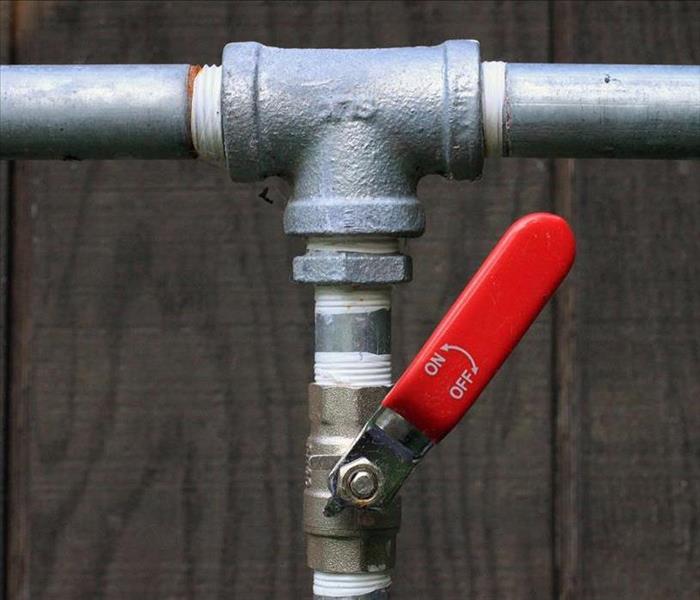 Water shut-off valves can prevent damage to your property by stopping the water supply immediately.
Water shut-off valves can prevent damage to your property by stopping the water supply immediately.
Most people in the United States are used to the conveniences of running water in their homes and places of work. It has become a mainstay of modern life and one of the many reasons we live healthier lives. That is, until disaster strikes. Commercial disaster response includes water shut-off services. Water loss can mean many things, including a disastrous event for your business if you don’t take the necessary steps to minimize the damage.
What is Water Shut Off?
Water Shut Off is an emergency service often offered by plumbers in your area during times of disaster. They will come to your business as soon as possible, usually within a few hours, and turn your water back on. It is important because many companies, especially restaurants, rely upon running water to stay in business. If you don’t have running water, you could suffer significant losses.
How Does Water Shut Off work?
The process of water shutting off is simple. A plumber provides you with the necessary tools and takes measurements of your system. Once these are done, they leave to make their initial call. The plumber will contact the utility companies and tell them that you have a water leak. If this happens at night, it can be challenging for your employees, so we recommend contacting your plumbers early in the morning to minimize disruption to your employees’ schedules.
Why Your Main Water Shut-Off Valve Is So Important
Many people are unaware that they have a main shut-off valve in their office or commercial space. It is usually located in the basement, on the water line itself. It is easy to identify and usually has a red handle marked with “Do not turn off” written on it. This valve can prevent damage to your property by stopping the water supply immediately.
This valve also serves as a way for you to stop the water for another reason. If you have a house built with an older sewer line, it may not have been updated yet. If this is the case, you may need to use the main shut-off valve on your house to prevent the sewer from backing up. It can be hazardous because it can flood areas of your property and cause severe damage. It is best to contact a plumber to help you determine if this is the problem.
How to Prevent Water Shut Off
The best way to handle water shut-off is always prevention. Make sure you have a plumber come by and check your system when you make changes in your building or just for annual maintenance. If disaster strikes, it will make things easier for everyone, and you naturally want the plumber working with the utility company on the problem. You can look online by searching "water shut off team near me" or "find a plumber" in your area, so they are ready to get started as soon as possible.
Water Shut Off is an essential service designed to prevent unnecessary damage to your business. If you don’t take these steps, you could be putting your property and your employees at risk.
Contact a Commercial Disaster Response to help you prevent water damage and help minimize any financial loss associated with it.
Commercial Disaster Response: Roof Leaks
5/16/2022 (Permalink)
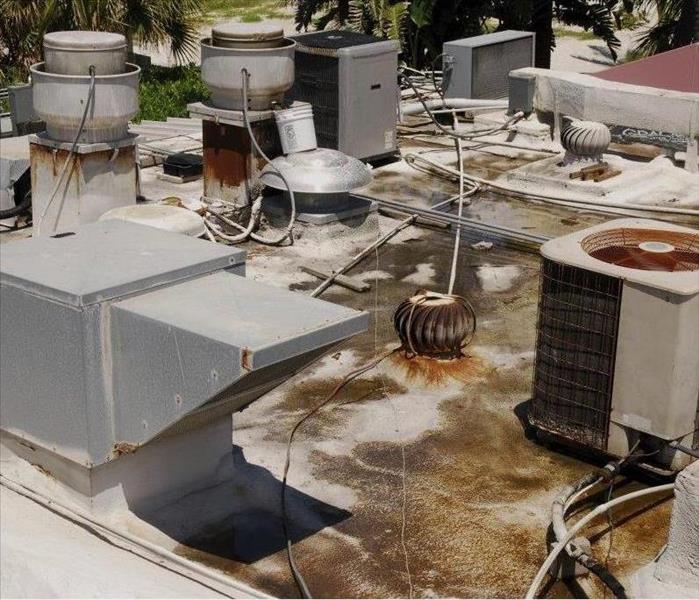 Some types of roofing are more durable than others, and some types of weather may cause the material to deteriorate more quickly than others.
Some types of roofing are more durable than others, and some types of weather may cause the material to deteriorate more quickly than others.
If you've ever been unfortunate enough to have a roof leak, you know how frustrating it can be. A roof leak can cause storm-related damage and damage to the property, but it also causes major issues with water buildup. Of course, if your roof is leaking due to an issue like heavy rain or ice accumulation, then your commercial buildings will likely collect this excess water in the form of puddles on the ground below. However, when you have a roof leak, the water will spill over the roof's edge and begin to pool beneath your commercial buildings. Usually, this means that there is too much water pressure within the structure, causing damage.
Here are some common causes of roof leaks that can lead to catastrophic water damage in your commercial buildings:
1. Leaky Gutters
Gutters are an important part of any roof system. They are designed to direct rainwater off the roof and into a gutter system. It is very common for gutters in commercial buildings to become damaged because of heavy rain. Due to heavy rain, a layer of leaves builds up on top of the gutter, and eventually, this accumulates into large clumps. To have your gutters properly cleaned out, it is best to have them inspected either by an experienced roofer or a professional roof cleaner. This will allow the gutters to be cleaned and maintained regularly not to accumulate debris that can damage them.
2. Unvented Chimneys
Several forces can damage a chimney, but even with regular cleaning and maintenance, a chimney can eventually fail. It is very common for chimney caps to develop cracks or holes due to corrosion. This can lead to water pooling inside the structure, which leads to leaks and damages caused by water. Once a chimney is damaged, the structure will need to be replaced.
3. Decaying Roofing
There are different types of roofing material for different weather conditions. Some types of roofing are more durable than others, and some types of weather may cause the material to deteriorate more quickly than others. Regardless of which type of roofing you have, it is very common to develop small cracks or leaks in the form of downed shingles or rotted areas in your building's roof. If you look at the condition of your roof during heavy rain or after the rain has stopped, you may notice that the shingles are bent and torn, or some areas appear to be older than other areas of your roof. This usually means that roofing is leaking and is causing damage to your commercial building.
4. Corroded Pipes
Pipes are very important to every structure to have running water and drainage. However, pipes can develop leaks over time due to corrosion and neglect by the property owner. One of the biggest leaks within a pipe system is from corroded faucets in sinks or showers. When pipes are corroded, they may become damaged and begin leaking contaminants through them.
Preventative Measures
There are a few ways to prevent roof leaks, but some of them may not be possible depending on the location and structure of your building. Here are preventive measures which can be taken to prevent leaking:
1. Installation of ridge vent
Roof vents are necessary to allow hot air to escape your roof during the summer season, but they can also cause issues with roof leaks. Water accumulation in the attic can cause shingles to develop cracks and leak. The water will likely pool on top of the ridge with a ridge vent instead of leaking into your building's structure.
2. Inspect your roofs regularly
If there are areas in which you notice developing leaks on your roof, schedule an appointment with your roofing contractor to have them fix these areas. A professional roofer will be able to inspect the roof and make recommendations on how to keep it from leaking again.
3. Adding a second layer of shingles
If a roof is old and has developed leaking issues, you may want to consider adding another layer of shingles to repair the roof. The first layer of shingles may have already developed some holes, causing water to leak into the roof. By adding another layer of shingles, you will increase the strength of your roof and make it less likely for water to get inside.
Conclusion
While the conditions of your roof are important, there are many ways to prevent roof leaks and water damage. If you live in an area that is prone to heavy rainfall or snowfall, you may need to inspect your commercial buildings regularly to make sure that your property is safe. An experienced professional can help you evaluate the condition of your commercial buildings and make recommendations on how best to repair or replace any damaged areas.
Free Commercial Inspection, What’s the Catch?
5/2/2022 (Permalink)
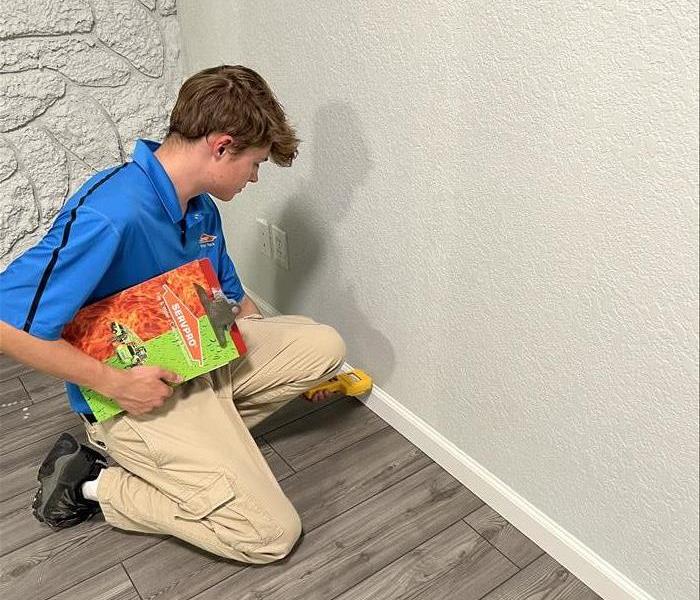 SERVPRO technician performing a moisture reading with a penetrating meter during a commercial inspection
SERVPRO technician performing a moisture reading with a penetrating meter during a commercial inspection
Do You Think You Have a Water or Mold Issue?
A property inspection by SERVPRO of Winter Park is a comprehensive check on commercial and residential properties to look for signs of water, fire, and mold damage or potential issues that may lead to these damages. It typically takes about 90 minutes to complete but the duration may vary based on the size of the facility. The inspection can either offer peace of mind that damage was not found or help to get the process started by preventing additional damage. The restoration specialist conducting your property inspection will be experienced in water, mold, and fire damage and will share their knowledge as well as outline the process for you should you need additional assistance with existing damages.
By this point, you may be thinking this all sounds great but there is always a catch, isn’t there?
So What’s the Catch?
Our franchise is fully transparent with our service charges and we can honestly say there is no catch!
As a restoration business, a free inspection helps us to prospect potential work when we find damages that would otherwise go unnoticed until they worsened. It is our foot in the door for new clients and job sites. We also place immense value on building trust with commercial property managers and becoming their preferred vendors based on the work we’ve done for them. If we inspect a commercial property and don’t find damages or the property owner is reluctant to address the issues found, the inspection remains free of charge. We make no money and the property owner is left knowing the damages and conditions of their building or facility.
If our inspector finds damages and the property owner enlists our help as a restoration business to address and remedy the situation, we then charge for the actual work that is done. Even in these cases, the majority of our bills get covered by insurance and we work with adjusters directly to ensure a smooth process.
What Happens During a SERVPRO Inspection?
A SERVPRO representative will walk through your property, sifting through the structure to pinpoint existing damages or issues that may eventually lead to damages.
As part of the inspection, your restoration specialist will look for:
- High moisture readings in drywall, baseboard, and cabinets. etc.
- Signs of discoloration, high humidity, building material deterioration, etc
- Floor defects like buckling, musky odors, ceiling wet spots
Reasons To Book a Free Commercial Inspection Today
- Simple and safe building procedure.
- It can potentially save you money in the long run. The free building inspection will allow you to fix any problems before they become worse and more expensive to repair, making sure that it is safe for use.
- It can help you towards making your commercial property safer for those working in it.
- You acquire an estimate for free that helps you know the amount you'll be spending so you can budget for it.
Prior Damages
Buildings and facilities may portray evidence of past damages from water or mold, especially if the property is aging. The evidence of these damages is sometimes subtle and requires a trained eye to detect. These damages may include but are not limited to the following;
- High moisture in structural areas
- Cracks and holes in walls
- Broken plumbing and leaking system
- Missing or broken windows and doors
- Rusty nails and screws
- Missing or damaged insulation
- Broken windows and door glasses
- Electrical and HVAC systems damage
- Bathroom, kitchen, and kitchen cabinets are leaking even after repair
- Water stains on ceiling, walls, or floors
How to Get Started
Ultimately, you have nothing to lose and everything to gain when it comes to requesting a free commercial building inspection from SERVPRO of Winter Park. If you are unsure or suspect you may have water, fire, or mold damage, give our office a call today at (407) 678-5391 and get your building or facility on our schedule!
How Business Interruption Insurance Can Help Your Business
5/26/2021 (Permalink)
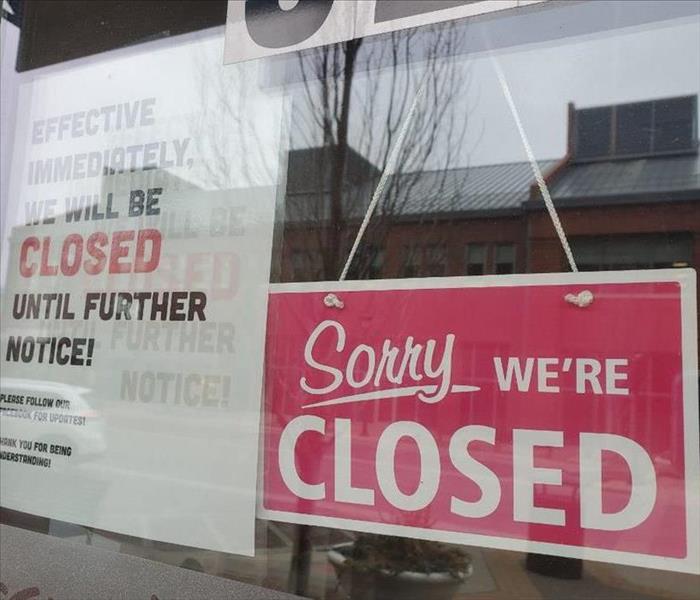 Unexpectedly having to shut down your business operations can have a serious effect on your business. Preparing for the unknown can be detrimental.
Unexpectedly having to shut down your business operations can have a serious effect on your business. Preparing for the unknown can be detrimental.
Downtime Protection for Your Business
Business interruption insurance can protect your business from the financial risks associated with unexpected events, such as natural disasters and fires.
As an owner of a small business, you might not have the funds to invest in this type of coverage on your own. One way to obtain protection for your business is through a group policy offered by various trade associations.
However, many employers find it difficult to keep up with rising premiums and increase deductibles due to their high-risk occupations.
If you're one of these people who feels stuck between making ends meet or providing for their family's future security, then consider investing in this type of coverage on your own instead!
Business Interruption Insurance: What Is It?
Business interruption insurance is commercial insurance that protects against losses sustained when a business is temporarily shut down because of an event such as fire, theft, or natural disaster.
Why Is Business Interruption Insurance Important?
Business interruption insurance not only covers your lost profits but also protects the value of future sales and ensures continued operation. This may help prevent financial problems from increasing in severity if you're unable to access other types of coverage, like life insurance, for example!
Benefits Of Buying The Coverage On Your Own:
- You can control how much coverage you have with the amount you pay out-of-pocket
- A company doesn't dictate what coverages are available or offer solutions tailored to your individual needs
- You get coverage that's tailored to your needs
- If you do need business interruption insurance, there are a few things to keep in mind:
- Be sure that the insurance policy provides adequate coverage for lost profits and overhead expenses.
- Get as many quotes as possible from various providers before deciding who best meets your individual needs. Doing this will help ensure you're not overpaying or buying more than you need!
How Does Business Interruption Insurance Work?
Business interruption insurance coverage works for business owners worried about the potential for an interruption with your company.
Businesses reliant on a fixed income from regular customers or sales, such as retail stores and restaurants, stand to lose significant amounts of money during these periods of uncertainty.
How Businesses Can Help Their Employees Using This Insurance Coverage
Employees who may have been counting on their days off to get caught up in other areas of work could be left scrambling when it comes time to go back out into the field.
In addition, if employees need to leave time because they've lost their job due to reduced business hours caused by an interruption, this can lead them down a tough road financially without adequate coverage benefits through government programs.
Not only does business interruption insurance provide coverage against lost income and wages, but it also covers lost revenue that you may have incurred as a result of the interruption.
Business Interruption Insurance Coverage
Businesses should be cautious about including enough coverage for their company to avoid negative financial impact from this type of situation or one like it in the future.
If your business relies on consistent customers, sales, work hours, or employees, then there are many ways that disruption could negatively affect your operations without appropriate insurance protection.
When considering how much coverage you need for these types of scenarios, remember what's at stake with an interruption: more than just money. You're taking away time-sensitive opportunities to get back into the field, potentially having to pay workers overtime (or provide unpaid leave) to cover the unfilled hours, and, of course, your company's long-term reputation.
Business Interruption Insurance
In post-disaster reconstruction...
Protecting against such an event is crucial because it could take months or even years before a business can be returned to normal levels - if ever.
It's common for insurance companies to offer commercial property coverage that will help recover from a disaster but not the damage caused by loss of sales during this period.
Business interruption insurance offers protection when business may have been disrupted due to the catastrophe (such as no electricity), preventing any potential losses incurred while the business is out of commission.
What Types of Coverage Are Included?
The types of coverage available to business owners include the following:
- Coverage for the shrinking of business as a result of natural disasters or other unforeseen circumstances.
- Insurance to cover additional costs incurred while starting up in another location after disaster strikes (such as rent, utility bills, and telephone charges).
- Insurance that will cover financial losses if disabled employees are unable to work during this time.
- Protection against lawsuits filed by customers who may have been injured from the event or property damage caused by it.
Business interruption insurance is an important type of coverage to consider for your business because you can't control what happens outside your premises, but you can protect yourself with coverage like this.
Business Interruption Insurance: What Isn't Covered?
- The business's most valuable assets, such as inventory and equipment.
- Business expenses that would be incurred after the new location is opened. You will need separate insurance for those costs.
Is the Cost Worth It for Your Company's Future Security?
Business interruption insurance premiums generally range from $600 to $2400 per year. The cost is worth it for the company's future security to maintain liquidity and stability during a difficult time.
An interruption of business can happen suddenly without any warning whatsoever. Still, there are many ways that your company could prevent such a disruption from happening by purchasing this type of insurance policy in advance.
10 Dirtiest Places in the Office and How to Clean Them
5/5/2021 (Permalink)
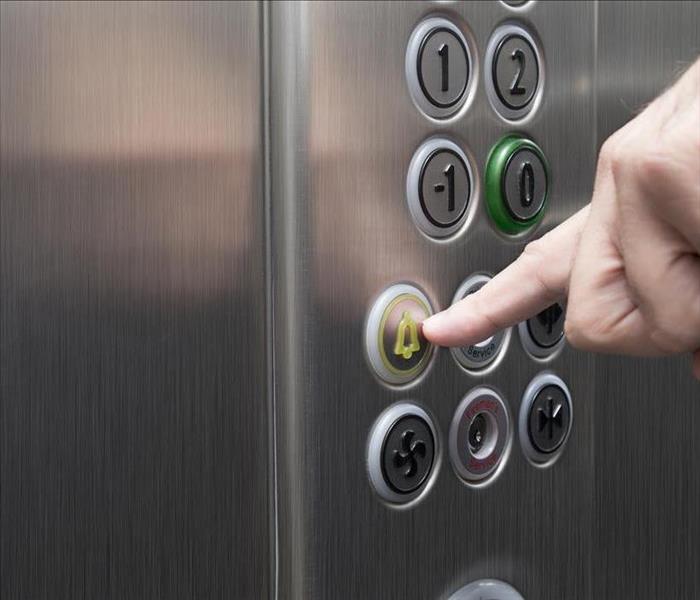 Research shows the average elevator button has 40 times as many bacteria as a public toilet seat.
Research shows the average elevator button has 40 times as many bacteria as a public toilet seat.
The COVID-19 pandemic has many business owners and building managers reassessing the cleanliness of workplaces and making changes to create cleaner, more sanitary spaces. Although research indicates that the coronavirus that causes COVID-19 isn’t transmitted via surfaces, that doesn’t mean there aren’t other dangers lurking in offices that need to be addressed.
Certain areas of any workplace are dirtier than others. Even when they look clean, many of these spots harbor harmful bacteria, viruses, and fungi that can cause health effects — not to mention attract pests and contribute to lost productivity.
Employees bear some responsibility for keeping their work areas clean and sanitary, but management also needs to address the bigger picture of sanitation and cleanliness in shared commercial spaces.
The Dirtiest Spots in Any Office
As more employees return to work during the COVID-19 pandemic, keeping the following often-dirty areas clean and disinfected needs to be a priority.
1. Elevator Buttons
How many people use the elevator in your building every day? Every one of them touches several buttons in the process, calling the elevator, choosing a floor, and opening or closing the door. With so many fingers touching the buttons throughout the day, it’s no wonder they make the list of the germiest surfaces in the office. Research shows the average elevator button has 40 times as many bacteria as a public toilet seat, including E. coli, Staphylococcus aureus, and methicillin-resistant Staphylococcus aureus (MRSA).
Wiping the buttons after every ride is impractical, but they should be cleaned and disinfected at the end of every day. Encourage people to wash their hands or use hand sanitizer after pushing the buttons as well.
2. Desktops
The average desktop has 400 times as much bacteria as a toilet seat. Every square inch can contain more than 20,000 viruses, bacteria, and fungi. Not all of the germs on your desk are harmful, but not cleaning and disinfecting your desk can encourage infectious germs to spread.
Keeping your desktop sanitary starts with washing your hands throughout the day, especially after touching shared surfaces. Coughing or sneezing into your elbow and throwing away used tissues or napkins also stops the spread. Before you leave for the night, wipe down your desktop, including your keyboard and computer mouse, to kill any germs and start the next day with a clean slate.
3. Electronics
Both shared and personal electronics can harbor germs that spread illness. You touch your phone and computer keyboard more than any other surface in your office. Your phone is the second most germ-filled spot on your desk, after your coffee cup, simply because you touch it so many times a day and it collects saliva while you talk. And your keyboard? That contains about 700 germs per square inch.
Shared equipment like photocopiers, fax machines, and printers also collect germs from multiple users throughout the day. Just think about how many times the “copy” button is pressed during a typical day. Unfortunately, shared electronics are often neglected when it comes to cleaning, making them a common source of illness outbreaks.
Wiping down your computer with electronics-friendly disinfecting wipes can reduce the germs in your workspace. Keeping some near shared equipment may encourage others to clean buttons and surfaces as well. Asking your cleaning service to pay attention to those shared items when cleaning can also help keep spaces sanitary.
4. Kitchen/Break Room
All surfaces in the shared kitchen should be disinfected daily. However, employees should also be responsible for cleaning up after themselves. Food waste should be properly disposed of to prevent pests, crumbs, and spills wiped off of counters and tables, and dishes washed or put in the dishwasher. At the end of the day, run the dishwasher on the sanitize cycle to ensure any shared dishes or utensils are cleaned.
Sponges should also be replaced often, ideally weekly. The moist environment allows harmful bacteria like E.coli and salmonella to grow, and when dirty sponges are used to clean other surfaces, that bacteria can spread. The garbage can might also harbor bacteria from food waste, which increases odors, so daily bag replacements and weekly deep cleaning are necessary.
5. The Coffee Maker
The coffee maker is one item in the kitchen that deserves special attention since it’s likely to be the most touched surface in the entire office. The pot handle is most likely to collect germs, but the pot and maker should also be cleaned to eliminate bacteria.
Coffee makers are common culprits for spreading harmful bacteria because they provide a warm, moist environment that supports bacterial growth. A 2011 National Sanitation Foundation study found that 50% of coffee makers contain mold or yeast, which can cause health effects. Although many models are self-cleaning, a weekly cleaning with vinegar gets the coffee maker squeaky-clean and germ-free.
6. Bathrooms
Just like at home, bathrooms at the office are germ hotspots. Multiple people touch toilet and sink faucet handles, the door, and other surfaces, and not everyone washes their hands properly after using the toilet. Daily cleaning and disinfecting are a must for restrooms.
So many people using the same bathrooms also increases the risk for clogs and backups. A sewage backup causes serious contamination that should only be cleaned up by professionals who have the correct equipment for doing so. Sewage is full of bacteria like E.coli that can cause serious illness, and unless they have the proper safety gear, employees should be restricted from the area until it’s fully cleaned.
7. Door Handles
Like elevator buttons, door handles are touched by multiple people throughout the day and collect germs in the process. Encourage people to wash their hands or use hand sanitizer after touching door handles, and wipe them down with disinfecting wipes at least once a day. Your cleaning company should also make cleaning all door handles a priority, especially entrance and exit doors and bathroom doors.
8. Water Cooler
The water cooler might be a popular gathering place, but the handle and spigot can harbor germs that are more harmful than any company gossip. Employees often fill their personal glasses or water bottles at the cooler without washing them in between uses, which spreads germs, and touch the handle several times a day.
Providing disposable cups for water can reduce some of the germs, but water coolers should be cleaned and disinfected with wipes daily to reduce spread. During cold and flu season, encourage employees to get water from the faucet or bring bottled water from home instead of refilling at the cooler to limit the spread of illness.
9. Vents and Ducts
HVAC vents and ducts collect all manner of dust, allergens, and debris as air flows through. Although well-maintained HVAC systems typically don’t have too many problems, over time, the ducts and vents can collect contaminants that affect air quality. Dirty air can lead to a host of problems for employees, from headaches and fatigue to respiratory conditions, so regular professional vent cleaning is necessary.
10. Curtains & Blinds
Window coverings like curtains and blinds can gather dust, as well as harbor bacteria and viruses that spread through the air. If they aren’t cleaned, these contaminants can affect indoor air quality and contribute to respiratory issues, especially for those with allergies or asthma. Window treatments can also collect odors, keeping your office from smelling fresh.
Having blinds and curtains professionally cleaned regularly can help keep this from happening. A thorough cleaning typically involves removing the window coverings, accessing hard-to-reach areas, and the curtains themselves may need to be dry cleaned or laundered — that’s why this is a job best left to the pros. However, the payoff is clean, fresh-smelling air.
Why Is a Clean Office Space Important?
Maintaining a clean and sanitary office is important to your business for multiple reasons. These include:
- Improved appearance and first impressions from customers and vendors.
- A safer environment for workers with reduced risk of accidents or injuries.
- Improved productivity.
- Fewer sick days due to illnesses spreading between employees.
- Improved air quality.
- Improved employee morale.
Although employees play an important role in keeping their workplace clean, they shouldn’t be responsible for overall building maintenance. For deeper cleaning and disinfecting, as well as significant cleanup jobs involving major damage, working with a professional cleaning company is a must.
Why Industrial Hygiene Is Important for Your Business and Employees
5/5/2021 (Permalink)
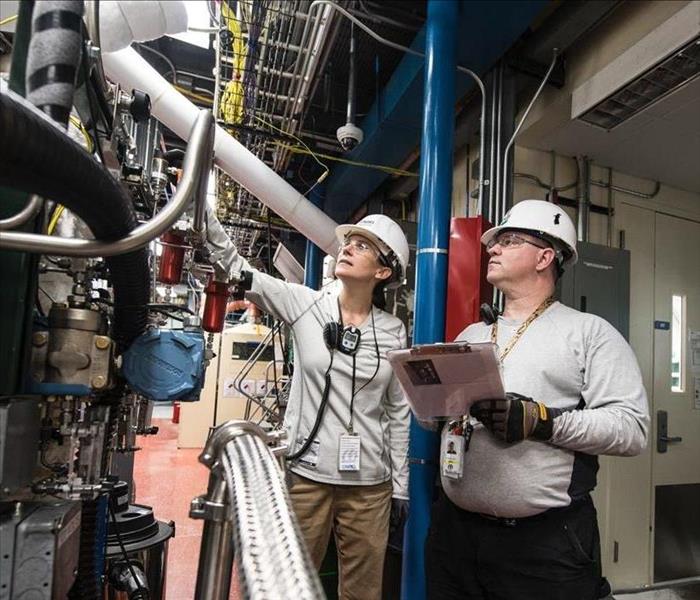 Localized ventilation systems can remove air contaminants before they can compromise workplace air quality.
Localized ventilation systems can remove air contaminants before they can compromise workplace air quality.
No matter your business or place of work, industrial hygiene — the protection of all employees’ health and safety from chemical, physical, and biological threats — is critical for short- and long-term corporate success.
To ensure that employers are taking necessary steps to defend employee health and wellness, industrial hygiene is regulated by The Occupational Health and Safety Administration (OSHA), a U.S. government body dedicated to perpetuating workplace safety. OSHA industrial hygienists make up more than 40% of all OSHA compliance officers, helping to enforce hygiene standards in evaluating jobs and places of business for a wide range of health hazards.
Benefits of Good Industrial Hygiene
Industrial hygiene standards are put into place to ultimately protect workers and their communities. Businesses that implement positive industrial hygiene can receive a wide array of associated benefits.
These benefits can include:
- Healtheir employees;
- Fewer substantiated healthcare costs to be covered by employers;
- Enhanced in-office task efficiency;
- Educated workers who now help to independently eliminate hygiene risks;
- Reduced employee absenteeism — which can cost employers $3,600 per year, per employee;
- Improved morale across the workplace.
Workplaces can directly impact the health and the output of the workers who frequent them. Both employers and employees can stand to benefit from correctly-implemented industrial hygiene practices, positively influencing productivity and overall wellness.
Major Industrial Health Hazards
A risk-free workplace can benefit employee competence and morale alike. Just as easily, a workplace characterized by even one preventable industrial hazard can quickly compromise a worker’s ability to perform tasks to the best of their ability.
Given the strong influence of a workplace on its employees, it's critically important that workplace hazards are correctly identified and quickly minimized. Consult the individual hygiene aspects below, alongside examples of real-life threats to workplace safety and steps all employees can take to minimize them.
Air Contaminants
Common air pollutants and contaminants are often one of the biggest culprits for poor overall air quality. Whether criteria pollutants, air toxins, or biological pollutants, air contaminants like carbon monoxide and lead represent one of the largest threats to immediate employee safety in the workplace.
According to the Environmental Protection Agency (EPA), air contaminants can even change the way the body works, potentially compromising organ functionality as they make their way through the skin, bloodstream, and digestive system. Over time, extended exposure to air contaminants in the workplace can also lead to accelerated lung aging, damaged respiratory system cells, and the development of diseases like asthma, bronchitis, and cancer.
Fortunately, the prevention of air contaminants in the workplace is made easier when you schedule regular air duct and HVAC cleaning. Keeping ducts clean can extend equipment life, and can have a very real, positive effect on the quality of the air that employees breathe every day.
Chemical Hazards
Industrial hygienists examine workplaces for a wide range of potential chemical hazards, given how quickly chemical misuse or negligence can lead to serious risk. From exposed flames and exhaust, potential explosives, and decaying organic material to smaller issues like battery corrosion, chemical hazards are often unnoticed before yielding serious issues for all employees.
As expected, even short or occasional exposure to chemical hazards can result in negative health consequences. These can include impaired physical development, permanent organ damage, pregnancy complications, and difficulty breathing after accidental chemical ingestion.
If a chemical spill is threatening industrial hygiene at your place of business, a reputed chemical cleanup service often represents the fastest, most secure solution. Seek help from chemical cleanup specialists trained in decontamination protocol and federally-mandated safety standards.
Biological Hazards
Sometimes, removal of biological hazards is as simple as effective mold remediation. Other times, your workplace situation may call for a full-scale virus response. Whether you’re facing a bacteria outbreak, mold, or even exposure to potentially contaminated animals, biological hazards are often overlooked before jeopardizing industrial hygiene.
The serious nature of many biological hazards often means calling in professionals. Fortunately, biohazard cleanup and restoration services can help expedite the cleaning, sanitizing, and disinfecting stages in the biological hazard removal process, returning employees to work as soon as the workplace — and its highly-used items like doorknobs, keyboards, and light switches — are sterilized and confirmed as safe.
Physical Hazards
A physical hazard is present any time an employee’s environment can harm the body, even without contact. Physical threats can include radiation, extreme temperatures, and noise. Fortunately, employees can often perceive the risk of physical hazards when near, and can always take steps to remove themselves from potentially risky situations.
In extreme cases, fire can also represent an uncontained threat to industrial hygiene and immediate safety. If a fire has devastated your place of business, fire damage restoration services can help restore your space and eliminate any remaining threats to industrial hygiene.
Ergonomic Hazards
At work, repetitive or strenuous movement can represent a serious threat to overall safety. Ergonomic hazards can include improper lifting techniques, sudden or awkward movements, and poor posture when sitting or standing.
Widely regarded as the most difficult type of industrial hygiene violation to identify in the workplace, ergonomic hazards can yield everything from sore muscles to long-term ligament damage and illness.
OSHA has even taken steps to distribute an ergonomic hazards workbook to employees — one that outlines risk factors like a musculoskeletal disorder — to promote education and action while protecting the body at work.
Recognizing and Controlling Hazards
The promotion of industrial hygiene standards at work begins when employers take steps to reduce employee exposure to occupational hazards. Businesses are responsible for the safety and well-being of all employees during work hours, and should adopt practices that prioritize safety over output.
Reference the below strategies available to any employer, to help them recognize and control potential hazards in the workplace.
Engineering Controls
One way to effectively control hazards in the workplace is to design the solution into the workplace itself. Known as engineering controls, these strategies are designed to minimize industrial hygiene issues through the proper design, creation, and use of company property.
Engineering controls are also implemented when employers and employees alike take steps to put barriers between themselves and potential hazards. For example, localized ventilation systems can remove air contaminants before they can compromise workplace air quality. Despite higher initial costs, engineering controls can help eliminate potential industrial hygiene issues before they even exist.
Work Practice Controls
Another way to reduce potential industry hygiene issues is by changing the way that tasks are performed. Work practice controls are especially useful when current practices place employees, employers, or their workplace at risk for potential hazards.
To implement work practice controls, employers should review and revise workplace habits and standard operating procedures for maximum risk aversion. This can mean eliminating workplace smoking, upgrading your commercial cleaning provider, and mandating sufficient handwashing practices before employees return to work. Quality building and reconstruction services can help businesses considering larger-scale work practice controls.
Administrative Controls
Shifts in official policy, employee training, or other high-level procedures are considered administrative controls, to reduce occasions where employees meet industrial hygiene risks in the workplace.
Many businesses regularly refresh employee manuals and update policies, which will make implementing administrative controls easier to achieve. These controls come directly from business administration, and involve policies that help employees avoid toxic hazards, potentially harmful repetitive motions, excessive temperatures, and other potentially dangerous workplace situations.
7 Benefits to a Clean Work Environment
5/5/2021 (Permalink)
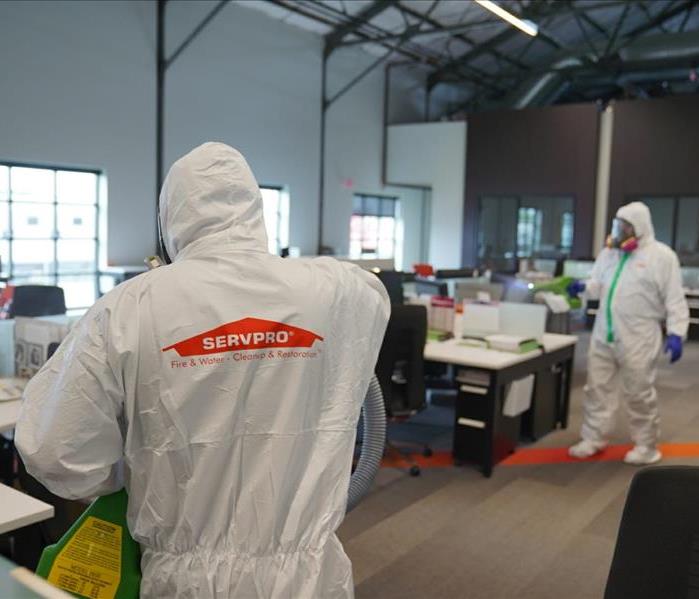 As a result of the COVID-19 pandemic, the need to keep workspaces and offices clean has become a significant priority.
As a result of the COVID-19 pandemic, the need to keep workspaces and offices clean has become a significant priority.
The Importance of a Clean Office
The COVID-19 pandemic has changed many aspects of everyday life; one of the most noticeable is the renewed focus on hygiene and cleanliness. With everyone focused on washing their hands and sanitizing surfaces, the need to keep workspaces and offices clean has become a significant priority.
The Worldwide Cleaning Industry Association (ISSA) estimates the cost of unclean workspaces is well over $200 billion annually, in large part due to lost productivity caused by illness and accidents. Investing in professional cleaning and developing employee policies and procedures related to cleanliness can go a long way toward the success of your company and the overall wellness of your workers.
Consider these benefits of a clean work environment when creating your plans.
1. Fewer Sick Days
Many employee illnesses can be directly linked to the conditions in their workplace. In one study, researchers investigated how quickly a virus spreads in a workplace. They inoculated several workers with a benign virus, and within four hours of the start of the workday, found the virus on more than half of the surfaces in the office. Also, half of the previously uninfected employees tested positive as carriers. Other research has shown that the average desk carries more bacteria and viruses than a toilet seat and that bacteria can easily spread to shared surfaces including doorknobs, elevator buttons, coffee makers, and office equipment.
Although not all viruses and bacteria carry illness, enough do that keeping surfaces clean needs to be a priority for preventing the spread of illness throughout the office.
There’s a pretty obvious correlation between illness and sick days — in fact, the Integrated Benefits Institute reports that the average employee takes 2.9 sick days per year. In a business with 100 employees, that amounts to nearly 300 days of lost employee productivity. While keeping the office clean may not prevent all employee illness, reducing the presence of harmful germs will undoubtedly help.
2. Improved Air Quality
Air quality is often overlooked when evaluating the cleanliness of a workspace, but it’s a vital component in employee comfort and overall health. Poor indoor air quality is closely tied to a host of issues, including issues with concentration and focus, headaches, and fatigue. Dirty air can also cause eye, nose, and throat irritation, and is linked to increased symptoms of respiratory conditions like asthma.
The Occupational Health and Safety Administration (OSHA) notes that poor indoor air quality has several potential causes, including poor ventilation and HVAC issues that limit fresh air intake. Cleanliness inside the building can also have an impact. Dust and allergens in carpeting or on surfaces or hidden mold can affect the air quality and cause health effects.
Investing in deep cleaning or mold remediation can lead to measurable improvements in air quality, increasing your employee’s well-being, reducing sick days, and increasing productivity. And while OSHA doesn’t have specific standards regarding air quality, it does have regulations relating to specific contaminants. Making cleaning a priority ensures compliance with these standards, reducing the risk of sanctions or liability.
3. Increased Productivity
A clean workplace doesn’t just keep employees at work; it actually helps them be more productive. Studies show the average person wastes 2.5 days per year looking for lost items. From pens to files, a messy workspace makes it difficult to find what you need when you need it. It also increases the chance of damage to important items: A spilled cup of day-old coffee can wreak havoc on electronics or important paperwork.
Spending a few minutes to straighten up and organize a work area reduces this lost time and protects important equipment and information. It also allows for surfaces to be cleaned and disinfected instead of allowing germs to spread, keeping everyone healthy.
4. Safer Workplace
Compared to dangerous jobs like logging or commercial fishing, working in an office is relatively safe. Still, thousands of people are injured at presumably “safe” jobs every year, often due to messy workplaces.
Many workplace injuries are slip or trip and fall accidents. Workers slip on wet floors or trip over hazards like cords or items left on the floor. Other common injuries include getting hit by objects falling off of shelves or tables, or injuries due to poorly maintained furniture.
Keeping workspaces clean and neat can prevent many of these accidents. Employees should be expected to wipe up or report spills and correct any hazards that may lead to injuries. Professional cleaning also helps ensure floors remain in good condition, reducing the risk of hazards that can cause a fall.
5. Makes a Good First Impression
Visitors may assume the condition of your business reflects the quality of your products or work. In fact, business cleanliness is a significant factor in customer preference, spending, and likelihood to return. ISSA reports that 94% of customers wouldn’t return to a restaurant if the bathrooms were dirty, and that cleanliness is the leading factor for customers when deciding where to shop. A clean environment also encourages customers to buy more: 60% of survey respondents noted that they buy more when a store is clean, well-lit, and pleasant.
6. Happier Staff and Visitors
Making a good first impression is only the first step. Keeping customers and staff happy also matters. Clutter and dirty spaces can have a detrimental effect on mental health; studies show that messy and overflowing spaces can create feelings of being out of control and anxiety, and can disrupt focus.
A dirty workplace may also cause tensions when employees are worried about germs or getting sick. Keeping the office clean can help these negative feelings and help employees feel more comfortable.
7. Relieves Stress
Coming to work and seeing a desk overflowing with papers, empty coffee cups, and other mess may contribute to feelings of stress or anxiety. And that cluttered and dirty environment can make it challenging to focus.
Researchers have found that a mess — whether a sink full of dirty dishes, a dirty floor, or just too much “stuff” piled around — interferes with our brain’s neural processing abilities. In short, your brain is so clogged by excess stimulation that short-term memory suffers, and it becomes more challenging to process information. This contributes to overwhelming feelings of stress, which can be prevented with a clean and tidy space.
Office Cleaning Tips
Keeping the office clean doesn’t have to take a great deal of time and effort. If everyone contributes to the effort, it’s possible to keep the space clean and healthy. These tips can make the process even easier.
- Invest in a professional cleaning service. A commercial cleaning service is a worthwhile investment. Even if cleaners only come in on a weekly or monthly basis, they can tackle big jobs or areas that employees can’t do daily. Professionals have the correct equipment and methods to thoroughly clean and disinfect surfaces and floors, and to ensure that often-overlooked areas like ceilings and walls are sparkling clean.
- Keep cleaning supplies handy. Make it easy for employees to manage small cleaning jobs by making supplies like disinfecting wipes, paper towels, and dish soap accessible. Even if you have a cleaning service, a broom and small vacuum allow workers to clean up minor spills right away before they become hazards.
- Discourage employees from eating at their desks. There are many reasons eating at your desk is a bad idea, and cleanliness is one of them. Encourage people to eat in the break area or outdoors instead, to prevent spills and leftover food that create messes. Leftover food or food in personal wastebaskets can cause odors, and attract pests, creating additional hazards.
- Assign daily cleanup tasks. Employees should be expected to keep their own work areas clean, but common areas are everyone’s responsibility. Develop a rotating schedule for everyone to contribute to cleaning shared spaces like conference rooms, waiting areas, and the break room. A list of tasks that can be checked off helps keep everyone accountable and the space clean.
- Allow time for cleaning. Some businesses schedule time for tidying and cleaning at the end of the day to ensure it gets done. Encourage your team to build 10-15 minutes into their schedule at the end of the workday to spend putting work away, wiping surfaces, and taking out the garbage.
7 Restaurant Health Code Violations and How to Avoid Them
5/5/2021 (Permalink)
 Restaurants are encouraged to maintain quality personal hygiene. Insufficient hand-washing is a common cause of health code violations.
Restaurants are encouraged to maintain quality personal hygiene. Insufficient hand-washing is a common cause of health code violations.
Any business or organization responsible for foodservice is subject to regular inspection. Health code inspections ensure that state and federal food-management guidelines are met, to keep restaurant employees and guests safe.
Restaurants found to be in violation may face penalties until problems are resolved. Some issues can be fixed by restaurant owners or managers on the spot, while other, more serious violations require a follow-up inspection to confirm changes have been made in adherence with regulations.
In most circumstances, restaurants are also subject to penalties of a varying degree, depending on the severity of the infraction. Reference some of the most common restaurant health code violations below, alongside suggestions for how to avoid each.
1. Poor Personal Hygiene
Restaurants are encouraged to maintain quality personal hygiene, behaviors that can help eliminate the spread of potential disease and keep food and surfaces clean for use. Following personal hygiene standards established by the U.S. Food & Drug Administration is important for the protection of all restaurant guests and employees. When restaurants fail to accommodate these standards, they risk incurring a health code violation and further penalties.
Common Mistakes:
- Insufficient hand-washing techniques;
- Wearing intrusive jewelry, like rings or watches, while at work
- Use of the wrong sink for personal cleansing;
- Missing hairnets from restaurant staff members on food lines;
- Exposed employee meals in places of work.
How to Avoid a Personal Hygiene Violation
Restaurants that foster proactive habits in staff members can work to avoid personal hygiene health code violations. Specifically, restaurant owners and managers should regularly update staff members on the newest sanitation best practices, and gauge feedback on how well the restaurants accommodate current cleanliness standards.
Providing staff members with a straightforward personal hygiene checklist — including basic tasks that include wearing a hairnet, hand washing, and cleanliness checks — can go a long way toward preventing personal hygiene violations as a team.
2. Poor Kitchen Sanitation
As far as the general cleanliness of the kitchen goes, kitchen sanitation includes the washing of all commonly-used kitchen areas, surfaces, tables, and other areas frequented by guests or restaurant staff members. Without adequate kitchen sanitation, dirty areas become ripe for mold and other infectious agents, making attention to detail important when it comes to cleaning.
Following standard kitchen sanitation practices can help your restaurant reach long-term success. Just as easily, poor kitchen sanitation can lead to violations, fines, and the eventual closure of your business.
Common Mistakes:
- Collections of mold, mildew, or residue in the corners or along the bottom of food storage containers, ice bins, and other receptacles;
- Unaddressed grease on commonly-used utilities;
- Sticky or neglected soda fountain machines, particularly nozzles;
- Adopting incorrect mold remediation practices, that can make your situation worse;
- Incorrect, or incomplete, sanitation of utensils or dishware;
- Rotting food.
How to Avoid a Kitchen Sanitation Violation
One of the first steps in avoiding a kitchen sanitation health code violation is securing regular mold remediation services from a quality provider. You’ll be provided personalized advice regarding any upcoming local or state health examinations, alongside all the resources you need to guarantee complete mold removal. And if flooding has potentially compromised building structure, or you’re worried that mold or other issues remain after waters receded, water damage restoration can ease concerns and help align your restaurant with current kitchen sanitation codes.
A checklist is often key when it comes to avoiding kitchen sanitation violations. Since staff is likely responsible for a majority of the food handling and immediate operations, taking steps to educate employees on proper kitchen sanitation strategies can help guard against slimy ice bins, greasy oven burners, and moldy refrigerator interiors.
3. Time and Temperature Control
Commonly referred to as “TTC,” time and temperature control means storing foods at correct temperatures, and paying attention to storage durations. Whether your food is cooked or raw, time and temperature control helps restaurant managers and owners avoid spoiled ingredients and unsafe meals.
Failure to adhere to proper time and temperature control parameters can quickly compromise the success of any restaurant. That’s why health inspectors will take the time during routine health inspections to test for the proper time and temperature control practices, also checking the temperatures at which foods are stored and prepared.
Common Mistakes:
- Lack of time and temperature-specific labeling on foods;
- Neglected foods left out for unidentified or excessive amounts of time;
- Frozen, time-sensitive foods left to thaw or decay on shared surfaces;
- Improper temperatures set for food storage, that can allow for stagnant moisture and black mold growth;
- Use of dysfunctional or non-validated thermometers.
How to Avoid a Time and Temperature Control Violation
Avoiding time and temperature infractions is made easier once restaurant owners create and implement a HACCP (Hazard Analysis and Critical Control Points) plan. No matter your restaurant’s size or income, every restaurateur can benefit from a solid HACCP plan that ensures time and temperature control health codes are followed.
In addition to hazard analysis steps, time and temperature control can also be established when restaurant owners take steps to thoroughly train employees on the use of all temperature-related instruments — including meat thermometers. All staff should also follow a consistent food labeling system, that identifies, at minimum, contained foods and anticipated expiration dates.
4. Improper Food Storage
The improper storage of food items can quickly mean health code infractions for your restaurant. In general, any food items not actively in use should be properly stored to prevent food from spoiling, spilling, or contaminating other ingredients.
When searching for improper food storage violations, health code inspectors look not only for adequate container use at proper temperatures but also for a present and consistent labeling system. Foods stored in refrigerators must also be arranged by storage order. The order, from top to bottom, is: foods ready to consume, seafood, raw beef and pork, ground meat and poultry, then raw and ground poultry.
Common Mistakes:
- Inconsistent, incomplete, or missing food labeling practices;
- Use of containers not approved for food;
- Storage of food in unsealed containers;
- Storage of food containers in incorrect locations;
- Refrigerator storage of food containers in an incorrect order.
How to Avoid a Food Storage Violation
Proper staff training can help you altogether eliminate the possibility of improper food storage. Adoption of a consistent food labeling process eliminates the possibility of label-based misunderstandings, and daily checks on stored foods can help prevent spoiled foods from counting toward health code violations.
5. Chemical Use and Storage
The use of chemicals around the kitchen is hardly new. Oftentimes, the process of cleaning a large kitchen involves the use of high-grade cleaning chemicals to sterilize and prepare surfaces, utensils, dishware, and other items for future use.
The chemical-use-and-storage component of a restaurant health inspection deals mainly with the proper employment of chemicals around food. Whether it’s an out-of-place spray bottle, an unlabeled container of disinfectant, or even a misplaced mop, chemical use and storage violations can mean serious fines, and the possibility of chemically contaminated foods.
Common Mistakes:
- Unlabeled or mislabeled chemicals;
- Improperly stored chemicals;
- Outdated safety data sheets and chemical information;
- Storage of chemicals in excessive proximity to foods;
- The incorrect concentration of liquid cleaning supplies.
How to Avoid a Chemical Use and Storage Violation
The potential for food contamination from misplaced chemicals calls for careful avoidance of chemical use and storage violations. Safety data sheets — simple-to-use tables that allow staff to identify characteristics of each chemical — keep chemicals properly labeled, stored, and accounted for.
If chemicals in your restaurant have spilled, or you need to properly dispose of used chemicals, biohazard cleaning services can help restore your restaurant to code and help you remove chemicals from your business in a safe, efficient manner. Restaurant staff should also learn to recognize suspect odors, to identify potential biohazards that might be maturing.
6. Improper Tool and Utensil Storage
After a restaurant’s tools and utensils are used, washed, and otherwise prepared again for use, it’s important that they are correctly stored. Health inspectors searching for violations in a restaurant setting can impose penalties if any tool or utensil is left in an incorrect location, or if it has been stored incorrectly.
Proper tool and utensil storage are important for a restaurant’s success. Items that are left out can risk contact with foods, surfaces, and other kitchen resources, increasing the risk of cross-contamination.
Common Mistakes:
- Storing used utensils in dipper wells without the required running water;
- Drying utensils with a towel, instead of an air-drying process;
- Stacking cutting boards, instead of storing them vertically;
- Stowing clean knives together, instead of in a knife holder;
- Storing utensils in convenient locations, instead of in designated spaces.
How to Avoid an Improper Tool and Utensil Storage Violation
Staff awareness is critical for any restaurant owners or managers looking to avoid improper tool and utensil storage violations. No matter the size of your kitchen, make sure that all utensils have nominated locations, where they should be returned after use. All staff should be aware of these storage locations.
7. Cross-Contamination
Cross-contamination takes place whenever bacteria or other harmful microorganisms are accidentally transferred from one location to another. In kitchens, this can mean the unintentional transfer of food particles, chemical contaminants, or simply bacteria from unwashed hands. Whenever food is prepared, handled, served, or stored, cross-contamination is a legitimate risk.
Whether it’s the cross-contamination of pathogens or harmful glass particles, this type of contamination can immediately harm guests in many ways. As one of the most important facets of food handling and safety protocol, cross-contamination is a major focus for any restaurant health inspector.
Common Mistakes:
- Shared cutting board use without sufficient washing between different types of raw ingredients;
- The use of miscellaneous containers to scoop ice;
- Unsafe handling of dishware without gloves or other protection;
- Reuse of soiled towels;
- Reuse of unclean utensils without proper washing and drying.
How to Avoid a Cross-Contamination Violation
Restaurant owners must take steps to avoid cross-contamination violations. Employees are taught how to avoid cross-contamination if they participate in a food handler’s certification course. Even if you don’t require employees to complete some sort of food safety course, walking staff through the basics of the correct cutting board and knife usage can go a long way toward necessary cross-contamination prevention.
Staying Ahead of Inspection Violations
Restaurant owners and managers need to remain vigilant in their adherence to health codes, to protect both restaurant guests and employees.
These continued sanitation awareness efforts could include:
- Teaching restaurant staff correct sanitation practices;
- Requiring all utensils and cleaning supplies to be returned to designated locations before nightly closing;
- Daily checks to all food and chemical labels, to gauge the safety of continued use;
- Regular commercial restaurant cleaning services to help you guard against all kinds of biological contaminants;
- Integration of a regular cleaning schedule, for both kitchen and seating areas;
- Keeping contact information for reputed 24-hour emergency restoration services accessible in the kitchen, in case of urgent health code risks.
- Dedicated time to deep-clean all restaurant bathrooms, and allow them time to air dry.
What Should Commercial Business Look for When Hiring A Restoration Company?
3/4/2021 (Permalink)
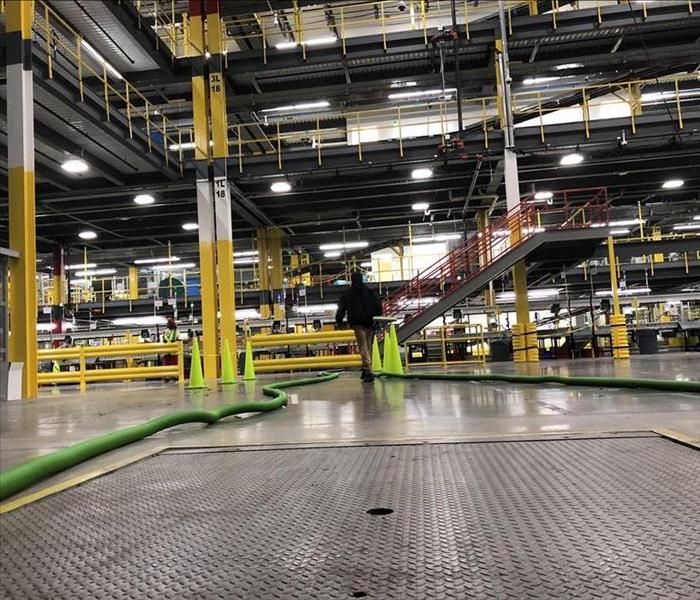 Many commercial properties experience damage on a larger scale and need the help of a restoration company with more manpower and equipment.
Many commercial properties experience damage on a larger scale and need the help of a restoration company with more manpower and equipment.
Understanding What To Look For In A Restoration Company
When fire and water damages stall businesses, it is essential to look for a renowned commercial restoration company to restore the property quickly because every minute spent in the business restoration means lost productivity and revenue.
At our restoration company, we value entrepreneurs’' time, which is why we have the proper employees with high training, skills, and equipment to restore the property within the required time or faster.
We offer commercial water and fire damage restoration, commercial cleaning services, commercial mold remediation, and commercial storm and big events.
There are things that business owners should put into consideration before hiring commercial restoration companies.
1. Certifications
Certifications show that the company is genuine, and they are ready to take accountability for anything that goes wrong in the cause of the job. Business owners should ensure that the restoration company is certified by the Institute of Inspection, Cleaning, and Restoration Certification (IICRC).
The IICRC ensures that the company adheres to the highest restoration process standards and ethics. It is also important to enquire about other certifications that the company may have within specific restoration fields like fire restoration or mold remediation.
2. Experience And Competency
Consider how competent the employees are and the skill level. Also, consider the experience and for how long the company has been operational. Companies that have been alive for a long time deliver more quality services because of the knowledge and skills gained in the course of their work.
3. Their Services And Prices
Ensure that the commercial restoration can handle all restoration aspects and within the required time. Also, look at their prices. While cheaper is not always better, ensure that their services are worth the money. Also, check if they give discounts or if they charge per service or in packages.
4. Emergency Services
Sometimes, damages occur when they are not expected, and it may be past working hours. Check if the restoration company has 24/7 services. Companies with 24/7 services can be trusted to handle any type and size of a job whenever and wherever.
It also means that the company is serious about meeting the customers' needs and is convenient and reliable. Our services are available 24/7, and so are our customer service lines.
5. Response Time
Anytime damages occur, they get worse with time without the needed attention. Business owners must consider restoration companies that respond fast to their calls, get to the site in good time, examine the damage, and quickly give expert recommendations.
Also, consider how much the company’s customer care takes to respond to questions and concerns. Companies that respond to concerns fast are serious about customers and are committed to quality services.
6. Restoration Timeline
Every minute spent on restoring the business premises means that the business loses. Some companies may need the restoration done within a set timeline.
While not all constructors deliver quality work in a rush, some will accommodate the customers' needs and do what needs to be done to complete it in a reasonable time and deliver quality results.
7. Read Reviews
All businesses advertise themselves as outstanding and delivering high-quality services. However, the customers never lie and give their honest reviews about the services offered.
Business owners should read those reviews to better understand the company's quality of services, advantages, and disadvantages. That saves them a lot of time and money and makes it easier to choose a restoration company.
8. Check Their Website
With technology evolving every day, many people are posing to be quality service providers with fake websites. To determine if a website is genuine, check if there is a link to the company’s services.
Things To Avoid
• Companies that ask for large amounts of money at once. It is understandable when a company asks for a deposit before services are delivered and the rest to be paid after. Companies should layout payment terms before the work begins.
• Companies that want to start working without a contract. A contract binds the customers and the restoration company, which means that the company can be held liable for anything that goes wrong. It also means that the client and company agree on the pricing and payment method, and timeline.
• A company that advertises itself and claims that customers get what they paid for. Business owners should ensure that customer reviews guide them.
Commercial COVID-19 Cleaning in the Orlando Area
3/4/2021 (Permalink)
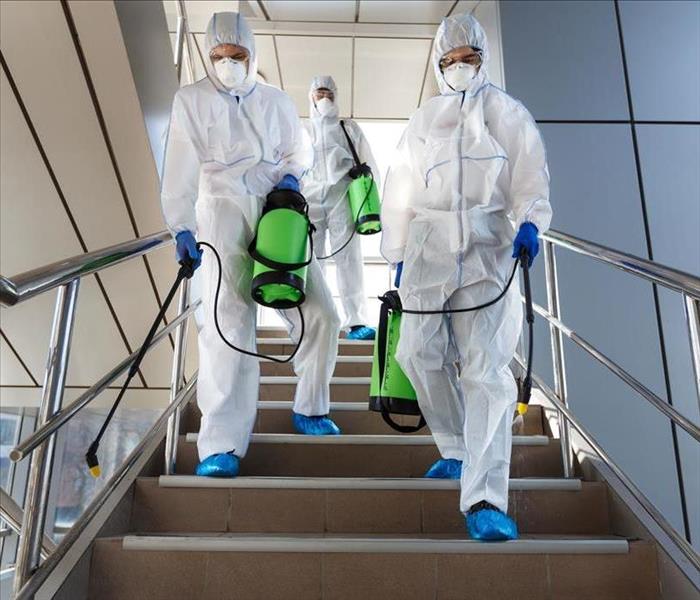 SERVPRO of Winter Park cleans and disinfects all corners of your operation areas with a powerful CDC-approved disinfectant such as Benefect Decon30
SERVPRO of Winter Park cleans and disinfects all corners of your operation areas with a powerful CDC-approved disinfectant such as Benefect Decon30
How are Cleaning Companies Adjusting to COVID-19?
The COVID-19 pandemic has greatly impacted businesses and livelihoods around the world. The highly-infectious disease has brought about challenges never experienced before. Millions of people have been infected and hundreds of thousands killed across the globe.
In order to minimize the spread of the disease, the federal and state governments have issued a raft of health measures that both individuals, institutions, and businesses should adhere to before commencing their operations.
Most of these guidelines have to do with cleanliness. It is believed that coronavirus spreads through the air and on surfaces.
As such, cleaning companies have had to adjust to the new COVID-19 cleaning requirements. As businesses and learning institutions start to reopen in Orlando and other parts of the country, one industry will be in the spotlight – cleaning.
Cleaning for COVID-19 is beyond basic janitorial work. It calls for a company that has adequate experience in biohazard cleaning to ensure that your office or workplace is free from any contaminants and ready to be used by workers and the general public.
For several years now, SERVPRO has specialized in biohazard cleaning in Orlando and other parts of the country. Our objective is to ensure that homes and commercial facilities are safe for use for those who live there.
Since the coronavirus pandemic broke out, we have stepped up our game to meet the demands of clients in various parts of Orlando.
We understand the seriousness of the virus and the threat that it poses to the public. That’s why we use high-quality and CDC-approved products such as Benefect Decon30 in our cleaning and disinfection operations.
Is COVID-19 cleaning necessary?
According to information from the Centers for Disease Control and Prevention, coronavirus has the ability to survive on different surfaces, although this is not primarily how it spreads. It is still not clear for how long the virus can survive in the air and on surfaces.
A big percentage of people who get infected don’t show any signs or symptoms until after two weeks. That’s why taking early precautions is very important. You don’t know who is infected or which part of your commercial facility has been contaminated.
The only way to minimize the spread and allay fears from workers and the public is to hire an experienced company for your COVID-19 cleaning services.
It doesn’t matter whether you are operating a restaurant, a daycare, commercial office, retail store, or warehouse, it is your responsibility to ensure that anyone who works or visits these places is safe.
As mentioned earlier, basic cleaning is important but it won’t kill the germs and prevent the spread of the disease. It needs both cleaning and disinfecting all corners of your operation areas with a powerful disinfectant such as Benefect Decon30.
At SERVPRO, we have created cleaning and disinfecting protocols for COVID-19 aimed at helping companies and businesses that believe their workplaces or operational areas have been exposed to the dangerous virus. We have a high-trained team of experts who are actively involved in the daily operations across Orlando.
How we clean and disinfect surfaces for coronavirus
Cleaning surfaces for coronavirus requires a lot of attention and focus on details. First and foremost, we have specialized products and equipment dedicated to our work. Unlike regular cleaning operations, COVID-19 cleaning requires a lot of planning.
We basically focus on cleaning and disinfecting all surfaces in the building. The first step involves our team of experts visiting your commercial facility to carry out an assessment. If you suspect that your building or office has already been exposed, we will use our coronavirus cleaning protocol to ensure that the place is disinfected accordingly.
You don’t have to worry about occupying the place after the cleaning and disinfection exercise because all our products are purely organic and safe. We ensure that every product we use has been approved by the Environmental Protection Agency (EPA) as well as the Centers for Diseases Prevention and Control (CDC).
Some of the areas of focus for our cleaning and disinfection exercise include desks, touch screens, door handles, seating areas, handrails, shopping carts, keyboards, hallways, and many more. The nature of cleaning will also depend on the type of your commercial facility.
For example, if you are operating a spacious warehouse, we can use aerosolized disinfectants to ensure that the whole place is decontaminated. Our biotech experts use personal protective equipment (PPE) like gloves, gowns, and face masks to protect themselves during the disinfection process.
By the time we are done, you can be assured that your office, restaurant, or warehouse is safe for use. We will also ensure that all the materials used are properly disposed of as biohazardous waste. Our company also has customized cleaning for clients who contact us in advance for such services.
What should you expect during cleaning and disinfecting of a facility that has been exposed to the virus?
• All the areas used by a person suspected to have the virus are closed off
• Leave outside windows and doors open and increase air circulation using fans
• Cleaning and disinfecting workspaces used by an infected person
• Vacuuming the space, if necessary
• The area can be opened for use after a thorough cleaning and disinfection exercise
Bottom line
The threat of COVID-19 is real. Over two million people have already died and others are still lying in hospitals. It is important to take the virus with the seriousness that it deserves.
As the owner of a business or commercial facility, you have a duty to protect your workers and the public by hiring an experienced COVID-19 cleaning company.
Creating and Writing a Business Continuity Plan
10/20/2020 (Permalink)
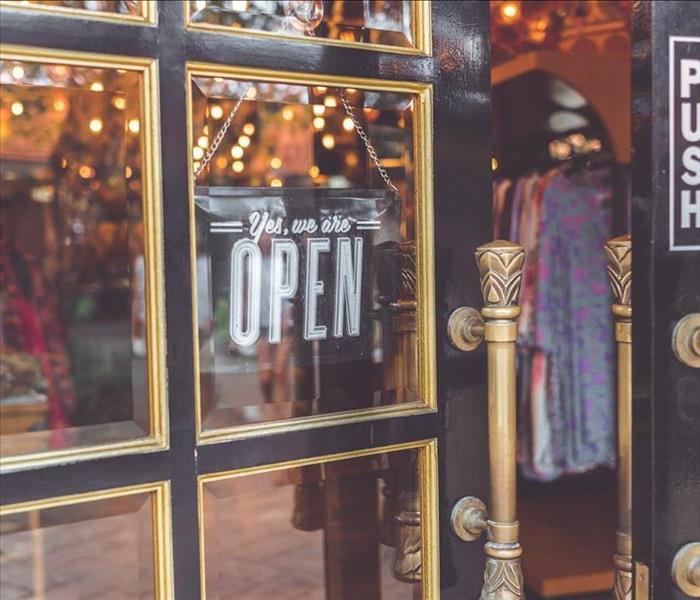 Keep your doors open by having a business continuity plan to prepare you for natural disasters.
Keep your doors open by having a business continuity plan to prepare you for natural disasters.
Prepare for the Future With a Business Continuity Plan
As a small business owner, it’s important to be aware of the ways in which a disaster could affect your business. From a cyber attack to a hurricane, preparation for any type of disaster is the key to keeping your business running. One of the best ways to prepare is to create a business continuity plan well before a disaster strikes.
With a solid continuity plan in place, you can rest assured your business will continue humming along, even as you repair and rebuild. Learn how to create a business continuity plan for any incident to ensure you’re adequately prepared to continue operating as usual, no matter what disaster you’re dealing with.
What Is a Business Continuity Plan?
A business continuity plan is a plan that outlines how your business will continue functioning after any disruption of normal operations. The plan outlines the systems and procedures you’ll activate and put in place after an emergency, natural disaster, or another disruption (including cyberattacks) occurs.
When you follow your business continuity plan, your business and employees should be able to continue working while you repair and rebuild. With a plan in place, you ensure you can continue selling and servicing customers with the same ease, accuracy, and timeline your business provided before the disaster occurred.
What Is the Primary Goal of Business Continuity Planning?
When you create a business continuity plan, your main goal should be to ensure your business can continue running at optimal performance after a disaster has occurred. Your plan should include detailed instructions, procedures, and processes that you and your staff can follow to keep working, even after an emergency.
The business continuity procedures you’ll need to implement may vary, depending on the disaster or disruption you experience. Common occurrences that could negatively impact your business include the following:
- Cyberattacks.
- Pandemics.
- Natural disasters.
- Utility outages.
When you have a thorough business continuity plan in place that addresses these occurrences, you’ll keep your staff working and your customers happy as you address the damages.
What Does a Business Continuity Plan Typically Include?
The elements included in your business continuity plan depend on the type of business you have and the specific processes and actions that keep it running smoothly and successfully. A useful continuity plan should be realistic and easy to follow. It should provide detailed steps that outline how to continue working during a disaster.
Since the effects of a disaster aren’t easily predicted, the business continuity plan should also be adaptable and easily edited as needed. Your plan should include several back-up options or alternative procedures to address different scenarios. A reliable business continuity plan provides efficient and convenient ways for the business to remain productive after a disaster.
How to Write a Business Continuity Plan
To create your own business continuity plan, you’ll need to analyze your current business practices. Following the steps detailed below will ensure your continuity plan is comprehensive and easy to implement when needed.
Identify the Scope and Goals of the Plan
Consider how your business currently functions and what processes could be negatively affected by a disaster. List the employees, systems, and procedures that keep your business running, employees working, and customers satisfied.
If you think these procedures may be affected by a disaster, you’ll need to target them in your plan and provide alternative ways to ensure they can still be followed. Outline the goals of your business continuity plan, such as ensuring you can fulfill orders or continue producing goods. Be sure the procedures you include in the plan thoroughly address how to achieve these goals during a disaster.
Create an Emergency Preparedness Team
If you’re busy working with insurance adjusters and commercial restoration professionals after a disaster, you may not have time to improvise and troubleshoot around every challenge or consideration your business faces. Before a disaster occurs, designate a few reliable employees within your business to help.
Train these employees on how to deal with emergencies and go over the business continuity plan with them to ensure they understand how to implement it. With an emergency preparedness team, you won’t be the only person who can delegate the implementation of your continuity plan and adjust it as needed, which frees up your time to deal with repairs and other issues.
Identify Key Business Areas and Perform Risk and Impact Assessments
In some cases, you may not have ways to modify the way you do business after a disaster. If you have to eliminate certain services or procedures, your business continuity plan should address these issues.
Perform a risk and impact assessment with your team to identify the tasks that may be neglected after a disaster. Consider how you’ll address these issues and how you could potentially modify services to lessen the impact. For example, if you’re dealing with water damage in your storefront and can’t allow customers into your retail space, consider sidewalk sales until the flooding damage is remediated.
Identify Critical Business Functions and Prepare a Plan For Each
Chances are the success of your business relies on several functions, such as marketing, accounting, and administration. Identify all the critical functions within your business and create a plan to ensure they’ll continue to thrive, even after a disaster. You may need to rely on outside vendors or online processes to ensure your business continues to function.
Create a Plan to Maintain Operations
Keeping your business operations running smoothly during a disaster is the only way to maintain customer satisfaction and continue attracting prospective clients. Consider all the operations you need to continue performing so you can serve customers seamlessly, such as shipping and communication.
Then, address each operation and implement an alternative plan to ensure you can still provide these services adequately. You may need to involve subcontractors, switch your suppliers, or use different shipping options.
Train Staff and Stakeholders
Review the business continuity plan with your staff and stakeholders for feedback. Train your staff on the alternative procedures that may need to be put in place in the case of a disaster. With training on how to implement these new processes, your staff can seamlessly follow the steps in your business continuity plan without incident.
Update the Plan as Needed
When you perform trial runs with your staff, be open to changing your plan if specific steps aren’t efficient. Disasters are unpredictable and additional issues may arise when you’re dealing with an emergency.
Remain flexible and ready to update your business continuity plan with each situation. For example, if a disaster caused water damage and you need to close the office for professional mold removal, you may need to revise your continuity plan to include work-from-home procedures for your staff.
Technological and natural disasters can bring your business to its knees. However, with a comprehensive, realistic, and flexible business continuity plan in place, you’ll ensure your customers are satisfied and your employees are productive, even after a disaster.
Water-Saving Tips for Commercial Buildings
10/20/2020 (Permalink)
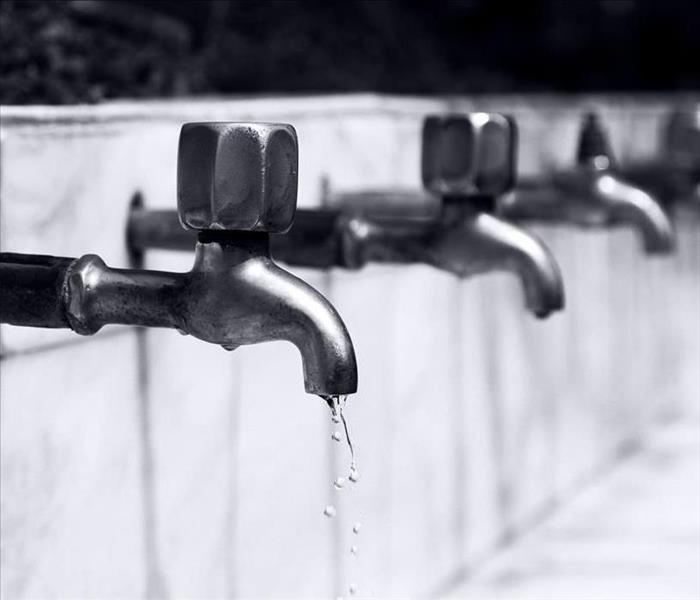 As a business owner, you can save money and increase sustainability with water-saving technology.
As a business owner, you can save money and increase sustainability with water-saving technology.
How to Reduce the Water Consumption of Your Business
As a business owner, you’re always on the hunt for ways to save money and increase sustainability. Your commercial building’s water consumption may not be the first thing you think of when contemplating money-saving strategies. However, when you integrate water-saving technology with your daily business operations, you’ll experience several benefits, including:
- Making your business more efficient and sustainable.
- Lowering utility bills.
- Finding it easier to prepare for natural disasters.
- Lowering your risk for water damage or mold.
Offices use about 9% of the total water utilized by commercial and institutional buildings, according to the Environmental Protection Agency. Most of the water in offices is used for heating and cooling, landscaping, and restrooms.
For the sustainability of the world’s water supply, it’s crucial that commercial building owners address water consumption issues and implement water-saving technology. Review the information below to learn more about the technology you can invest in to make your business more water-efficient.
Invest in Commercial Water-Saving Technology
Commercial buildings are known for using a lot of water, but there are several technologies and ways to make them more efficient. Implementing one or more of the following technologies will help your business use less water.
Commercial Water-Saving Devices and Technology
When you install a sensor that keeps track of water usage, you’ll have a better idea of when and where your building is consuming the most water. A water pressure regulator is also helpful because it records the current water pressure within your plumbing system.
High water pressure wastes water and can damage your pipes. A burst pipe may result in flooding, which requires the assistance of a commercial restoration company. If it’s not addressed properly, dangerous mold may grow, requiring mold removal services. Ensuring your pressure is correct and efficient saves you from these threats and reduces your utility bill. Additionally, even a step as simple as installing low-flow faucets and toilets can cut water use in half, or even more.
Landscaping irrigation is usually the culprit for much of the water usage in commercial buildings — as much as half of all irrigation water may be wasted due to evaporation, runoff, or inefficient watering practices. Timed irrigation systems can be set to turn on at night when the sun won’t evaporate the water off the grass.
You should also consider installing a rain sensor in your irrigation system. If the system senses that it recently rained, it’ll skip a watering cycle since the grass already received the moisture it needed.
Grey Water Systems for Commercial Buildings
Clean water pumps into a commercial building and after it’s used, it’s released into the sewage system. The water that’s released is classified as black water, which is considered unsanitary and could be toxic without treatment.
Greywater is the wastewater used in sinks, showers, or washing machines. It’s also usually released to a water treatment plant after use and although it’s not technically sanitary, it carries less risk of being toxic or contaminated. Since greywater isn’t as unhealthy or dangerous, commercial buildings may adapt their own greywater recycling systems that allow them to reclaim the water so it can be used again.
When a greywater system is installed, it separates this water from black water. Then, it uses a thorough treatment and filtering system that may include sand filters, aeration, and pressure filtration. The clean water is placed in a storage tank and released for usage.
You must consult with an engineer and your local water authority before installing a greywater system. While this system is an expensive investment, reclaiming greywater is an efficient way to save money and reduce water consumption substantially over time.
Water-Saving Plumbing
If you’re focused on reducing water consumption, there are several water-saving plumbing options available. Be sure you’re paying close attention to plumbing leaks and repairing damages promptly. This alleviates the costs of repair, such as mold remediation after sustaining water damages. You could also consider:
- Plumbing insulation: Pipes that aren’t insulated can take a while to heat water. When a user turns on the hot water tap, they’ll need to let the water run until it finally reaches the desired temperature. With insulation, the time you wait for the water to get hot is sufficiently reduced, which also reduces needless water waste.
- Low-flow plumbing fixtures: You can install low-flow plumbing fixtures to sinks and toilets without installing an entirely new plumbing system in the building. With low-flow fixtures, less water flows through the fixtures when they’re turned on, cutting down on consumption and making workers more mindful of water usage.
- Energy Star appliances: If you have a dishwasher, washer, or other appliances, consider replacing them with upgraded Energy Star models. These appliances are rated to use less water during operation without sacrificing performance.
Additionally, consider replacing your aerators or installing water-free urinals to reduce water consumption in your commercial building.
Harvesting Rainwater
Most of the time, stormwater causes damage because it is associated with flooding. However, if you have the capacity to install a rainwater harvesting system, you can use this stormwater as landscape irrigation. Consult with an engineer and your local water authority to decide if the costs of system implementation are worth the collection in your area.
Depending on the size and layout of your commercial building, you may be able to install large barrels that collect rainwater. The water usually needs to be filtered for oils before it can be used for irrigation or other purposes. Plant low-water plants so your system effectively uses the rainwater that’s been collected.
Boiler Blowdowns and Cooling Towers
During the boiler blowdown process, water is removed from the boiler to minimize corrosion and scale. With automated blowdown controls, the system slows down the rate of blowdown to ensure water isn’t wasted. An automated blowdown process also prevents fluctuations in the frequency of blowdowns so the amount of water used is better controlled.
A cooling tower removes heat from a commercial building’s air conditioning unit by evaporating condenser water. To prevent your cooling tower from wasting water, consider installing a tower that uses stormwater instead of freshwater. Ensure your cooling tower is well-maintained and in good condition so it doesn’t needlessly wastewater throughout the process.
Although commercial buildings are synonymous with high water consumption, there are ways to ensure your business isn’t wasting this precious resource. When you implement one or more of these water-saving technologies, you’ll save money and invest in the sustainability of your building.
Downtown Orlando Commercial Fire Damage Advice
6/12/2020 (Permalink)
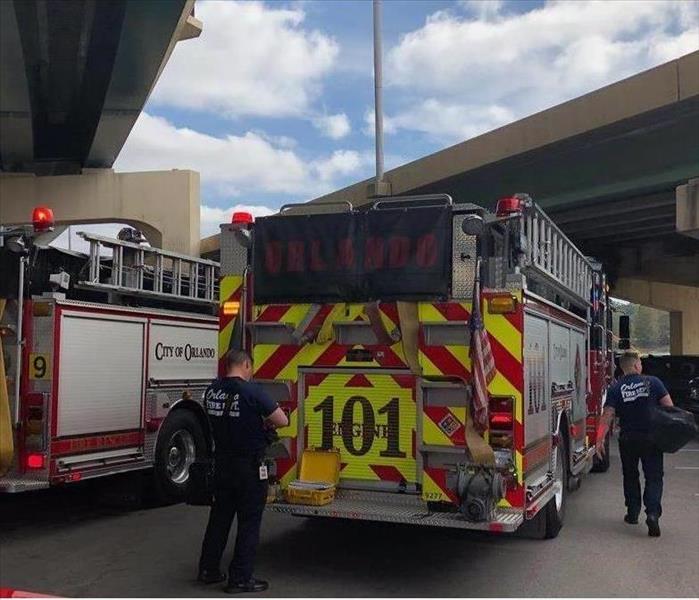 There are steps you can take to make sure your downtown Orlando business is as safe as possible from the threat of a fire.
There are steps you can take to make sure your downtown Orlando business is as safe as possible from the threat of a fire.
SERVPRO Offers Fire Damage Preventative Tips For A Downtown Orlando Business
Fire damage to a commercial enterprise can be catastrophic on the property damage issue and of closing the doors to clients and customers. A commercial property owner, having to deal with this unexpected extreme event, needs all the help he can get. The fact that the fire can force a business owner to stop temporarily operating or even shut down permanently can result in deep financial consequences. However, learning more about business fire prevention and what steps to handle them can limit business owners from experiencing substantial financial loss, stress, and the complete destruction of their property. Discover more about these important issues by referring to the quick reference guide provided for you below compliments of SERVPRO.
What Causes Business Fires? A wide range of factors can cause business fires.
- fire from an adjoining commercial property or suite
- an electrical fire, or commercial kitchen flare-up
- lightning strike, very prevalent in the Orlando area
- natural disasters like earthquakes, more likely a sinkhole
Business Interruption Insurance
Typically, companies who are not able to survive following a fire fail to do so because they did not have business interruption insurance. While companies who do purchase this insurance may find it challenging to recover fully, it is still easier for them to get back to business. Thus, although the insurance typically costs 10% more than a business owner's standard premium, the investment is considered to be a prudent and practical one. And SERVPRO is usually at the top of the list of preferred vendors for many insurance and property management companies. We can coordinate a restoration plan with your insurance adjuster and help manage the insurance claim, reducing your stress.
Fire Prevention Strategies
In addition to investing in business interruption insurance, business owners should implement the following fire prevention strategies:
- Do not store flammable items in an open spot. Keep an organized stockroom and inventory storage area to prevent damage from fire.
- Check quarterly that your smoke alarms are functioning properly, and if installed, working fire-suppressant sprinkler system.
- Develop and implement a thorough, effective fire evacuation plan, have lighted exit signs, and no blockage of emergency exit doors.
- Make sure that your appliances, electronics, and machinery are shut off when closed, if possible.
- Ensure that all fire extinguishers and emergency directions are in viewable and accessible locations, emergency phone numbers visible
- Make sure that your backup drives and critical paperwork are kept in a fireproof safe or cloud storage.
Call SERVPRO Today
Unfortunately, even extensive planning cannot prevent your commercial property from possible fire damage in Downtown Orlando. A lot can happen in this thriving environment. However, if disaster strikes, the professionals of SERVPRO can provide you with the fire damage restoration services that get your property and business back into operation. Our IICRC-certified technicians offer a fast response. And we can mitigate the water, smoke and fire damage and handle the restoration project, saving you money. From start to completion, our goal is to get your doors reopened in minimal time and cost. "Like it never even happened."
Commercial Restoration Presents Unique Challenges
SERVPRO of Winter Park has the equipment, experience, and training to handle large commercial fire damage emergencies in Downtown Orlando, a big box fire in Winter Park, or even a small motel in College Park. Because we are faster to any disaster, we respond 24/7 to all calls. 407 678-5391
Preparing a High-Rise Building For Water Damage in Orlando
5/27/2020 (Permalink)
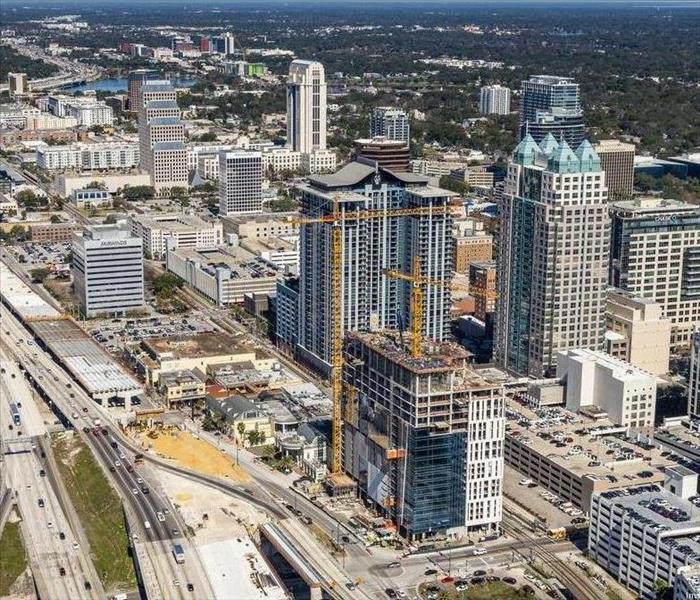 Water damage can compromise the structural integrity of your property. This makes damage prevention especially important for high rise buildings.
Water damage can compromise the structural integrity of your property. This makes damage prevention especially important for high rise buildings.
How To Prepare Your Orlando Business For Water Damage
One of the most challenging experiences an Orlando business owner can undergo is water damage. In addition to interrupting your daily operations, water damage can compromise the structural integrity of your property. However, learning how to prepare for this type of damage can prevent you from losing your emotional and economic equilibrium. Learn more about how to handle water damage by reviewing the steps and strategies outlined below:
Create an Emergency Plan
One of the fundamental things you should do to prepare your Orlando business is to create an emergency plan. This system will function as a guide for action if you are not present. Your contingency plan should include information regarding where all of the locations of emergency exits and fire extinguishers. It should also include the phone numbers of important people and businesses, including your insurance agent, the fire department, and your local SERVPRO.
Never Complete A DIY Project
In many cases, business owners want to start the cleanup process immediately after they experience water damage. However, this course of action is not prudent. In fact, there is a vast range of hidden dangers that water damage can cause on your property. Because most company owners are aware of these hazards, they can make themselves susceptible to both injury and illness by attempting to complete the remediation process on their own. Additionally, commercial property owners typically do not have the specialized equipment necessary to complete the restoration process with speed and skill. For this reason, it's important that you leave the remediation project to the professionals.
Selecting a Water Damage Restoration Company
Once you recognize that attaining professional water damage restoration services is important, you may be wondering how to find the ideal service provider. To ensure that you can get the best commercial water damage remediation services on the block, be sure to look for the following qualities in a company, like SERVPRO:
• 24/7 emergency services
• Excellent Better Business Bureau (BBB) rating
• Great online reviews
• Stellar customer service
• Satisfaction guarantee
• Established reputation
Call SERVPRO For Excellent Commercial Water Damage Services
When you find that your business property has been subjected to water damage, there's only one company to call for fast, friendly service: SERVPRO of Winter Park. All of our IICRC-certified technicians will offer you the detailed care necessary to restore your property quickly and correctly. We're ready to get your commercial property back in a pristine condition immediately, so call us today.
Locally Owned Company with National Resources
As a locally owned and operated business, SERVPRO of Winter Park is strategically located to respond quickly to your Orlando water damage and any emergency water event. Call us today! (407) 678-5391
Preventing Mold in Commercial Properties
11/20/2019 (Permalink)
 Commercial properties like schools should take precautionary measures to ensure any water damage incidents do not lead to mold growth
Commercial properties like schools should take precautionary measures to ensure any water damage incidents do not lead to mold growth
Mold growth in your commercial property can lead to structural damage to the property itself and health concerns for those exposed to it. There are many factors that can lead to mold growth as well as steps that can be taken as preventative measures. This article will cover both to keep you, the business manager or owner, better informed and prepared to handle a mold situation.
How Mold Can Spread in Commercial Properties
Mold thrives in damp, dark places. So you can find mold just about anywhere that moisture lingers in the air. Mold spores can cling to and grow on a variety of building surfaces including stone, brick, wood, drywall, and metal.
Here are three factors that contribute to the formation and spreading of commercial mold.
1. Moisture Due to Humid Conditions
When outside temperatures fall during the fall and winter seasons, mold often begins to form indoors where the air is warmer and more humid.
You can sometimes see condensation forming on the interior of glass windows and skylights. If this moisture drips down the walls and manages to penetrate into seams and cracks in the walls, it is very likely that mold will begin to grow.
2. Water Leaks From Roof and Plumbing
One of the biggest causes of mold infestations is leaks in the roof or leaky pipes in the walls. These leaks often go undetected for months or even years, allowing massive colonies of mold to fill the spaces in attics and inside walls and ceilings.
This water damage combined with mold can cause tens of thousands of dollars in damage, and it often will require entire facilities to be shut down for mold restoration and remodeling.
3. Condensation forming in an HVAC system
Other troublesome spots where mold forms in commercial buildings are the heating, ventilation, and cooling (HVAC) system. Due to the heating and cooling of the metal ducts and vents, condensation often forms on these surfaces that are hidden away from view. These dark, damp places become a breeding ground for various types of mold.
And the worst part is that the ventilation system then blows mold spores throughout the entire building. Those spores can lie dormant for a very long time. But once they come in contact with moisture, they can begin to grow and spread.
How to Prevent the Spread of Mold in Commercial Properties
Preventing the spread of mold should be a high priority for commercial property managers. Whenever mold or water leaks are discovered, swift action must be taken to prevent further growth and damage. Here are three strategies that need to be implemented consistently.
1. Inspect Moisture-Prone Areas Regularly
As noted above, the HVAC system needs to be routinely inspected for mold and moisture, particularly the evaporator coils and drain pans and pipes. Surfaces should be inspected, cleaned and disinfected once a year or more if necessary.
Roof tiles should also receive a professional inspection annually, and attic spaces should be checked for water damage too.
All kitchen and bath areas should be checked, including in the backs of cabinets and vanities, as mold thrives in dark spaces. And again, all surfaces should be cleaned regularly.
2. Clean and Disinfect All Surfaces Frequently
Routine cleaning cannot be emphasized enough. Not only should areas when mold and moisture are spotted be cleaned thoroughly, but all floors, walls and counter spaces should be disinfected regularly to kill spores that lie dormant.
3. Use Dehumidifiers to Reduce Moisture in the Air
Lastly, some commercial buildings that have routinely humid conditions might benefit from the use of dehumidifiers placed throughout the building or in conjunction with the HVAC system. These remove excess moisture from the air and make it difficult for mold spores to grow.
Fighting commercial mold can be a challenge for business owners and commercial property managers, but by knowing what to look for - and by engaging in consistent and thorough cleaning practices - mold can be kept in check to provide a safe environment for everyone.
Preventing Mold in Your Maintenance Closet
11/18/2019 (Permalink)
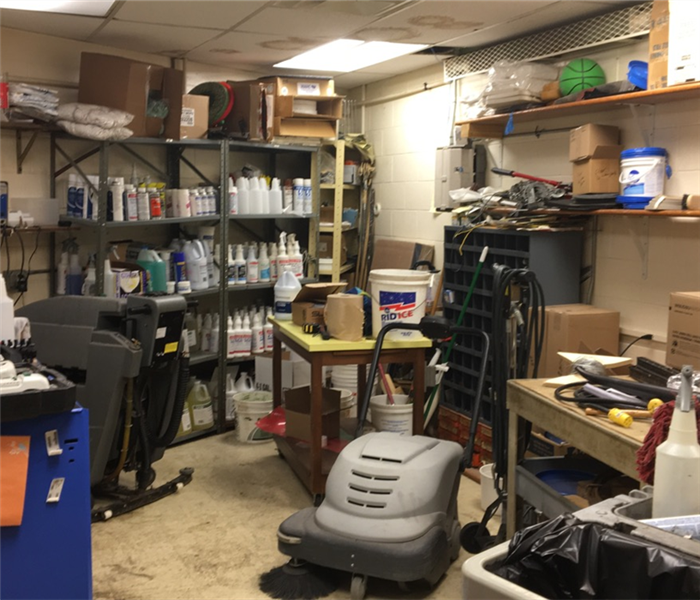 Maintenance closets are one of the most common places where mold growth is found in commercial properties.
Maintenance closets are one of the most common places where mold growth is found in commercial properties.
Lack of Air Circulation
Closets, in general, are a very common hiding place for mold. This is due to the fact that there is usually an absence of ventilation in closets. When you open a closet and then close it shut moist air can easily become trapped within. The moisture will usually lead to condensation on the wall without the chance of evaporation. This provides an excellent environment for mold to thrive in.
How to Prevent
The simplest task you can perform is to routinely check the walls in the closet for condensation. This can help you notice a moisture issue before it becomes a mold issue. However, the best way to prevent the problem is to create an avenue for air to circulate in and out of the closet. Installing air vents on the upper and lower areas of the closet door can help ensure better airflow and prevent moisture from being trapped
Leaking Water Heater
Many times, utility closets will share a space with a water heater. If the equipment has not been maintained, it is common for a leak to occur.
How to Prevent
Be sure to run routine checks on your water heater to make sure it is working efficiently for you and not causing a water damage situation in your closet which could lead to mold growth
Mop Buckets and Cleaning Supplies
Maintenance closets are usually deemed the perfect place for hiding mops, buckets, used towels, and other cleaning supplies. However, these items can lend to the moisture that gets trapped in your closet and leads to mold. This is especially true, for mop bucket spills!
How to Prevent
If possible, keep the items mentioned above away from your storage closet. If you must store them there, make sure that mop buckets are emptied and wiped dry. Mops should be squeezed of excess moisture and towels should only be returned to the closet if dry.
Floor Clutter
Clutter along the floor of your maintenance closet is the perfect opportunity to hide spills, moisture, and mold growth from your line of sight.
How to Prevent
Try to keep clutter to a minimum and put loose items on shelves in your maintenance closet. This makes it much easier to identify moisture on your closet floor or even cleaning after water damage that may have seeped into the closet.
Restoration for Commercial Properties
9/9/2019 (Permalink)
 SERVPRO of Winter Park has the equipment needed to handle disasters on a commercial scale.
SERVPRO of Winter Park has the equipment needed to handle disasters on a commercial scale.
Whether you do business in Orlando, FL or someplace else, commercial property damage can be a frustrating experience for any property owner. To address this expensive and stress-inducing concern, commercial restoration services are available to restore your commercial properties as efficiently as possible. These commercial restoration services typically provide an assortment of services that work together to fully restore your commercial property, saving you time and money in the process.
This article will go more in-depth into what commercial restoration services do, why they are important and how they operate.
Types of Damage which Impact Commercial Properties
In terms of damage, residential properties and commercial properties are essentially the same. The most common forms of commercial damage include:
• Mold: Mold is both an eyesore and is unhealthy to be around. Once mold has infested a property, it can rapidly spread as air-borne spores if left unchecked. Mold remediation measures are essential for preventing a property’s mold situation from out of control.
• Fire damage: Fire damage can come from many different sources. A lightning strike, a faulty gas stove or even a neglected, lit cigarette can be sources of fire damage to a commercial property. Fires can cause catastrophic levels of destruction to a commercial property, requiring restoration and cleaning services to return the property to normal.
• Water damage: Water damage can also come from a variety of sources. Severe floods, severe rain, and busted pipes are just a few of the ways that water damage can impact your commercial property. Water damage can create more damage if left untreated, resulting in issues such as contaminated water on surfaces and furniture, eroded materials and mold infestations. Electricity combined with water damage is a particularly deadly and destructive force.
• Wind and storm damage: Severe storms and strong winds can smash windows out, tear off roof tiles and damage unsheltered commercial equipment and other properties.
The Importance of Commercial Restoration Services
If your commercial property has some damage, you must reach out to a commercial restoration service as soon as possible.
Commercial property damage follows the same principle as most other types of damage: when left unchecked and unattended, the damage tends to get worse over time. What started as roof damage can lead to rainwater falling into your property, causing preventable water damage and mold issues. A neglected broken door can easily lead to your business’s valuables being susceptible to vandalism and theft.
Commercial property restoration is very important for another reason. Every day that your commercial business is closed due to damage, your company loses money and potential customers. Commercial businesses deal with a lot of overhead: bills, office and equipment rentals, salaries and services offered in good faith that they will be paid back. Commercial property damages worsen their overhead because the companies cannot earn their money back or turn a profit. Under these conditions, commercial properties will continue to lose money until they can open back up for business. Commercial restoration companies that can provide efficient services are an invaluable benefit to commercial properties under these circumstances.
Operations of Commercial Restoration Services
Commercial properties seeking commercial restoration services should look for companies that provide emergency services 24 hours a day. These types of companies can offer immediate relief whenever they are called, or as soon as emergency services have appropriately handled any potential health issues or risk factors.
Once the commercial restoration services arrive, they will usually start by assessing the damage level of the commercial property. Conducting the assessment will allow the restoration team to plan out a way to handle the damage and to start restoring the building’s functionality. It’s typical for the damage to be more serious than initially presumed. Smoke from a room affected by past fire damage may have seeped into another room. The mold that started in one room could infest another room due to water damage. To determine the extent of the damage, these restoration companies use sensors and other detection devices to accurately determine the extent of the damage to the commercial property.
Afterward, a commercial restoration company will begin any necessary preventative measures to ensure that no further damage will occur. This could mean making repairs to the property’s roof or its pipe system, or it may mean adding temporary equipment or components while the restoration team works.
Whatever isn’t salvageable will be disposed of. Some equipment and objects that normally stay inside of the commercial property may be temporarily moved from their usual places. For water damage, the restoration specialists will clear out water with large pumps and clean affected areas with scrubbers and other equipment. Any damp surfaces will have to be thoroughly dried to stop the potential for mold spreading to other rooms and surfaces. Sanitization measures will also need to be put in place for several health reasons.
Once the commercial property is cleaned and the building is sealed, the commercial restoration teams will repair and remodel its rooms. Numerous furnishings may need to be replaced, and other parts of the building may need to be redone, such as wall paint and carpeting.
These commercial restoration services will restore your commercial property after it suffers various sorts of damage. The restoration process will allow your business to return to normal operations as soon as possible.
Business Owner Tips
Here are a few tips on commercial restoration for companies such as yours:
• Do thorough research on commercial restoration companies near you before any damage happens
• Check for insurance policies that will cover damage from sources such as water and fire.
• Plan for worst-case scenarios and determine ways to keep earning revenue.
• Consider having staff work from home while restoration services are being conducted.
SERVPRO of Winter Park
If your commercial property needs restoration services, contact us, SERVPRO of Winter Park. SERVPRO of Winter Park serves the Orlando, FL area, providing a variety of affordable commercial property restoration services.
Fire and Water Damage in Hotels and Resorts
7/9/2019 (Permalink)
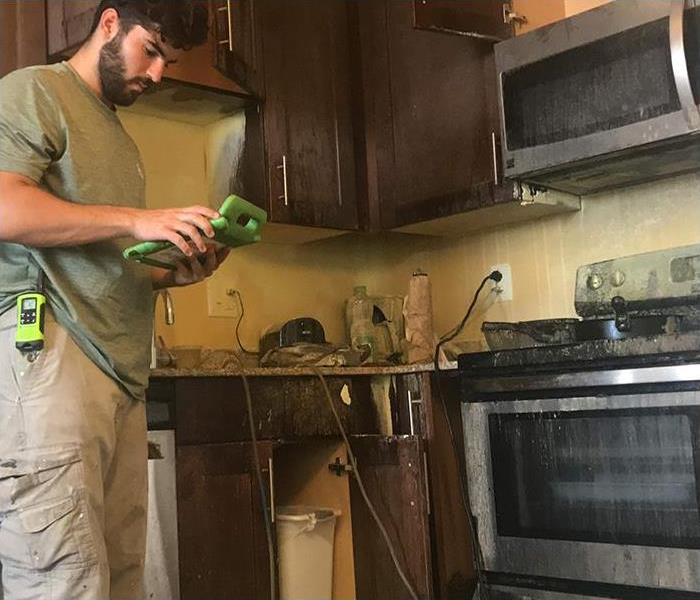 SERVPRO of Winter Park is trained to get you fast estimates with the best calculations to get you a clear idea of what repair costs may be.
SERVPRO of Winter Park is trained to get you fast estimates with the best calculations to get you a clear idea of what repair costs may be.
Cleaning and restoring your hotel, resort, convention center, or other hospitality business following a fire or water damage event can be a daunting prospect. Luckily, the experts at SERVPRO are here to help. We'll work with your management and staff to make sure any inconvenience to your guests is minimized as we isolate and fully restore the damaged areas.
Fire and Water Damage
Ruined flooring is perhaps the most obvious result of a water damage event. Water can destroy tile, vinyl, and wood flooring. It can also compromise the wooden sub-flooring beneath carpeting. Ceilings may also be affected as water leaking from one floor finds its way to the one beneath. Often times walls (or the bottom portions of them at least) will need to be replaced also, as they're made of porous materials that absorb water.
Soot, smoke damage, and water damage can destroy furniture, artwork, and other hotel property. Customer and client property may be damaged also, adding to your already considerable financial burden.
As costly as a fire or water damage event can be, the costs of not having the cleanup done correctly can be far greater. Improper or incomplete cleaning and restoration can lead to the growth of off-putting and potentially dangerous mold. Mold growth affects air-quality and is malodorous. Few things will damage the carefully maintained reputation of your resort, hotel or convention center quite so quickly as this toxic invader.
Why SERVPRO of Winter Park?
At SERVPRO of Winter Park, we understand that response time is critical when dealing with a fire or water damage event. A fast response can limit damage and potentially reduce costs. We stand ready twenty-four hours a day, seven days a week to serve Central Florida's many resorts, hotels, and convention centers.
No job is too big or too small for SERVPRO. We scale our response teams and equipment to best suit any given situation and, should the need arise we'll mobilize one of our Commercial Large Loss teams.
Whether you run a hotel, resort, school, or convention center, SERVPRO knows that you'll need to continue operating as cleanup and restoration are performed. We'll coordinate with your management to allow for normal operations to continue around the safely isolated cleanup area.
SERVPRO of Winter Park provides a host of other restoration services too. In SERVPRO's fifty-years experience, we've become experts in dealing with mold removal, vandalism cleanup, document recovery, and even the isolation and cleanup of biohazards.
There's no way to know when disaster will strike, costing you money in damages and disrupted operations. When and if catastrophe finds your hospitality business, you'll be glad to have the peace of mind that comes with knowing the experts at SERVPRO of Winter Park have your back.
If you've experienced a fire, or water damage event, visit our website to learn exactly how our many services may be applied to the quick and efficient restoration of your establishment. Or even better, call SERVPRO now at 407-678-5391.
Mold In Commercial Buildings and Schools
6/4/2019 (Permalink)
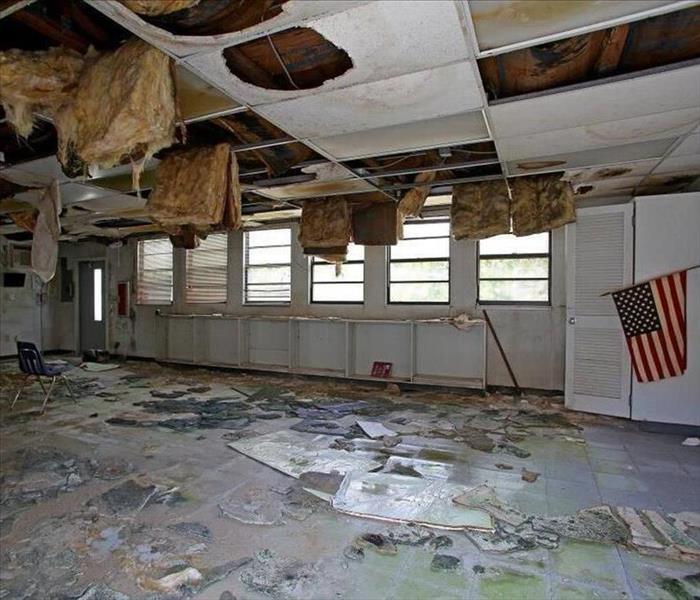 Mold can grow unseen in hidden areas such as in the ceiling above a classroom posing a danger to students.
Mold can grow unseen in hidden areas such as in the ceiling above a classroom posing a danger to students.
With each passing year, concern over indoor exposure to mold increases. The public has become increasingly aware of the potential dangers linked to mold exposure. In addition to personal properties and residences, property managers and those responsible for the maintenance of commercial buildings, hotels, and schools should be aware of hidden dangers and acquire some knowledge of mold growth to protect the health of building occupants. With some basic knowledge of the subject, even inexperienced and untrained individuals can be capable of making reasonable judgments as to whether a situation can be handled in-house or requires the help of trained professionals.
Molds Can Be Found Almost Anywhere
They can grow on virtually any organic substance, as long as moisture and oxygen are present. There are molds that can grow on wood, paper, carpet, foods, and insulation. When excessive moisture accumulates in buildings or on building materials, mold growth will often occur, particularly if the moisture problem remains undiscovered or unaddressed.
It is Impossible to Eliminate All Mold
This also holds true for mold spores in the indoor environment. However, mold growth can be controlled indoors by controlling moisture indoors. Molds reproduce by making spores that usually cannot be seen without magnification. Mold spores waft through the indoor and outdoor air continually. When mold spores land on a damp spot indoors, they may begin growing and digesting whatever they are growing on in order to survive. Molds gradually destroy the things they grow on.
Mold Can Have Various Effects on Health
Molds can produce allergens that can trigger health issues to inhabitants. Health issues can vary between individuals. Others are known to produce potent toxins and/or irritants. Potential health concerns are an important reason to prevent mold growth and to remediate/clean up any existing indoor mold growth. Since mold requires water to grow, it is important to prevent moisture problems in buildings. Moisture problems can have many causes, including uncontrolled humidity. Some moisture problems in buildings have been linked to changes in building construction practices during the 1970s, 80s, and 90s. Some of these changes have resulted in buildings that are tightly sealed but may lack adequate ventilation, potentially leading to moisture buildup. Building materials, such as drywall, may not allow moisture to escape easily. Moisture problems may include:
- Roof Leaks
- Landscaping or gutters that direct water into or under the building
- Unvented combustion appliances
- Delayed maintenance or insufficient maintenance are also associated with moisture problems in schools and large buildings
Moisture problems in portable classrooms and other temporary structures have frequently been associated with mold problems. When mold growth occurs in buildings, adverse health problems may be reported by some building occupants, particularly those with allergies or respiratory problems. Remediators should avoid exposing themselves and others to mold-laden dust as they conduct their cleanup activities. Caution should be used to prevent mold and mold spores from being dispersed throughout the air where they can be inhaled by building occupants.
Which Restoration Companies are Best for Commercial Jobs?
5/24/2019 (Permalink)
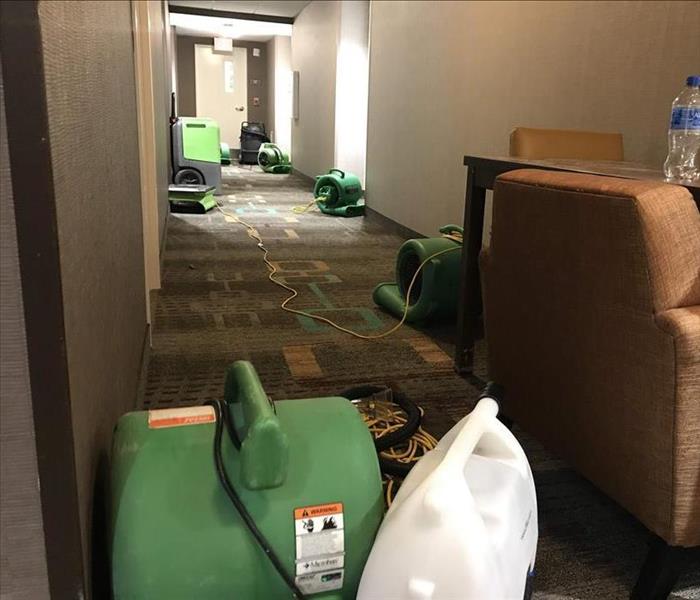 Commercial water losses at places such as hotels with multiple floors and units affected requires more equipment than most small companies have.
Commercial water losses at places such as hotels with multiple floors and units affected requires more equipment than most small companies have.
Sure, just about any restoration company you come across will tell you they can handle your disaster. The truth is, restoration has become an increasingly competitive market and many companies will make claims that they are unable to fulfill. Although many of these companies can certainly handle a residential loss, there are many additional factors to be considered when taking on water damage, fire damage, and mold remediation on a commercial scale. If you have a large commercial property and seek the help of a restoration company, here are a few things you may want to consider before making your choice.
1. How Long Has the Company Been in Business?
Find out how long the company you are considering has been in business. Less established companies may say yes to a commercial job and become overwhelmed before it is completed. A restoration company that has been in business for years is more likely to be experienced with the process and needs of handling a commercial sized job. They will be able to provide more accurate estimates and accommodate your operations to make sure further damage to your business is kept to a minimum.
2. Business Location VS. Home Office
There are many smaller restoration companies online that appear to be larger than they actually are. This can be accredited to good marketing most of the time. Many of these companies will run their operations from a home address. Because of the huge decrease in business overhead, they are able to undercut industry standard rates and offer to complete jobs at a lower cost. As is the case with most things, cheaper does not necessarily mean better. While this can seem appealing to most consumers, the fact is that the companies that do this oftentimes are unequipped to handle jobs at a larger scale. This can also cause smaller companies to band together to complete a larger job. The major downside to this is a decrease in the quality of work you are receiving by having multiple companies with different teams, standards, and levels of communication working on the same loss.
3. Equipment and Vehicles
Commercial jobs usually mean a larger amount of manpower, equipment, and vehicles. For example, a flooded bathroom and hallway in someone’s home will not require extraction on the same level as a pipe burst in a hotel or resort that has affected multiple units and floors. In this case, you want to avoid using a company that is only equipped with small portable water extractors and go with a bigger company that has truck mounts and is able to extract water at high volumes quickly. Also, a company that uses its own equipment and has a large stock will be able to get the drying process done much quicker than a company that has to rent equipment for your disaster.
Prevent Commercial Water Damage for your Business
4/1/2019 (Permalink)
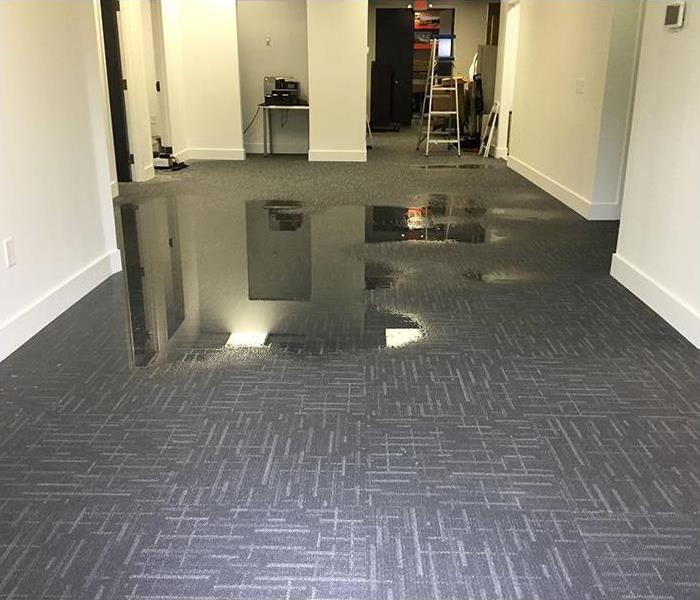 Water Damage can put your business operations on standby. Have a plan in place to minimize the possible delay.
Water Damage can put your business operations on standby. Have a plan in place to minimize the possible delay.
There’s nothing like the look and feel of a new business space, the machines all ready to run, furniture set up, and even the smell of the new carpet. Your mind is miles away from thinking about water damage. Hopefully, you’ll be lucky and nothing bad will happen. Or, heaven forbid you do have a flood, and the hard-taught lesson is learned. Either way, it’s always good to have some tricks and fixes up your sleeve so you can avoid commercial water damage and big headaches.
It has been said that commercial water damage is the most expensive problem you can have in a business with so many things that could be damaged and require repair or replacement. The damage may even cause further problems in the future. But there are several steps you can take to avoid the problems that could be thrown your way. It’s just a matter of keeping track of your office surroundings and acting to keep the status quo.
Here are a few tips to keep in mind when thinking about the prevention of commercial water damage in your business:
Make a Plan
- First, make a list of things that could happen to the items in your office. Come up with as many bad scenarios you can think of so you can realize the things to be taken care of.
- Find and store good contacts for services you may need in case of flooding, mold issues, or a fire.
- Make sure that you have an emergency space available to you in the unforeseen event that you need to have extensive renovations done on your office space.
- Also have a contact list of employees, vendors, and anyone else you may need to reach if things go awry.
- Have a good record of your belongings and find a place where you could take them for repair if necessary.
Put your plan into action
- Have an inspector come to check your building’s plumbing, pipes, roof, and the building structure itself.
- Be sure to follow instructions from your inspector regarding the issues he finds. Coordinate with the building’s owner to be sure you’re on the same page.
- Schedule yearly inspections so you know what needs to be repaired.
- Take a good look at any gutters that are adjacent to your office space. Clogged gutters can cause a great deal of trouble. It’s an easy fix in advance to keep a schedule and clean those gutters periodically.
- Parts and pipes age and need to be kept up to avoid leak problems.
Water damage in your business space is not only costly but traumatic. It can feel like you’ve taken one giant step backward in your goals and peace of mind. Understanding your potential pitfalls and knowing what you need to do to keep the status quo are your best options. But if you do have any kind of water damage, you can get great recommendations on the internet-they can help you through the process to ease your way.
Preventing Orlando Water Damage in Your Commercial Building
3/21/2019 (Permalink)
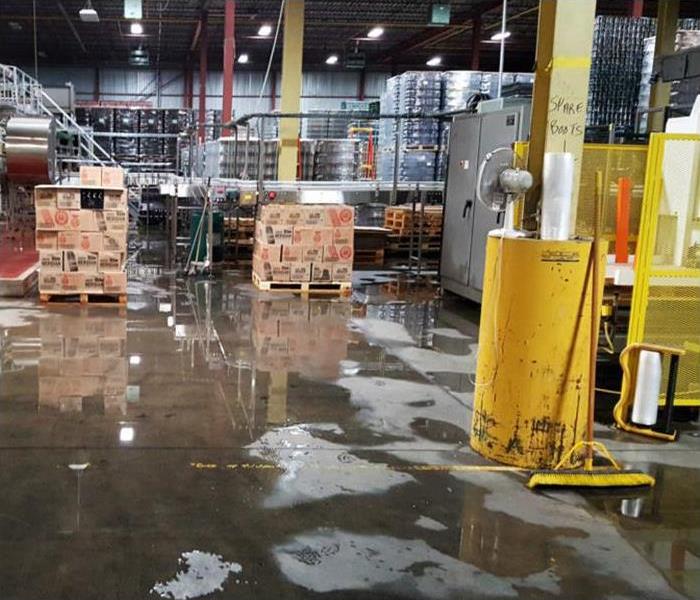 Water Damage can halt your commercial business operations and cost you a lot of money if you don't take precautionary measures.
Water Damage can halt your commercial business operations and cost you a lot of money if you don't take precautionary measures.
Making sure your Orlando business is able to run and function smoothly should always be a priority for business owners. Orlando water damage to commercial properties poses a serious threat to your operations. If not taken care of immediately, even a minor water issue can lead to extensive damage in a building such as mold growth and structural damage. Mold has the potential to make the damage increasingly worse, heighten repair costs, and affect the health of your employees. There are cases where water damage just cannot be avoided, such as natural disasters. However, most cases of water damage can absolutely be avoided and can be if commercial property owners take the proper precautionary measures to do so.
Because commercial spaces are typically larger than residential ones and are frequented by more people, they usually use up a larger amount of water. The costs for water are already higher but your utility and repair bills can increase dramatically with the presence of water leaks. To ensure your business is able to run without interruption, follow the tips below and prevent water leaks in your commercial property.
Schedule Routine Inspections
Paying attention to the property that your business is in is just as important as paying mind to the business itself. Make sure to routinely inspect the building’s pipes, plumbing, fire sprinklers, structure, and roof to make sure everything is as it should be or catch potential issues before they worsen. Wear and tear are completely normal and common in any building but should be addressed by a professional when noticed.
Seek Professional Assistance
An untrained eye can miss many issues. On top of looking for issues yourself, it is always best to seek the assistance of a trained professional in order to find and solve any problems you may have missed as well as conduct regular maintenance.
The more often you have regular maintenance to your property, the lesser chance you have for issues arising. It is important to know that just because you don’t notice any alarming concerns it does not mean that everything is ok. Leaks and damage can occur in hidden areas and can cause water damage to your Orlando property that is also unnoticeable. A professional can find these hidden issues and make sure they are properly taken care of.
Check and Clean Your Rain Gutters
Rain gutters are designed to redirect excess water away from your property when it rains. When they are not cleaned regularly they get clogged with leaves and other debris. The blockage makes it so that excess water is not able to escape and accumulates until it leaks into your building either through the foundation or the roof. Water damage that occurs this way can oftentimes extend from your roofing all the way through your insulation, walls, flooring, and foundation. Keeping your gutters clean and free for water to pass through can prevent a major disaster from happening.
Upgrades and Repairs
Water fixtures can wear out pretty quickly in a commercial establishment due to a large number of people using them. Many times, older pipes and fixtures are not able to handle the high-volume usage that comes along with the business. This can lead to leaks as well. Consider upgrading your fixtures and pipes to make sure they are able to handle the usage and do not wear out. An inspection by a professional will help to determine what should be upgraded in your building. You need to act fast though because the longer Orlando water damage goes unaddressed, the more the damage will spread, worsen, and will likely lead to mold growth.
If You Come Across Water Damage
In the event that you or a professional comes across water damage in your commercial building, you should take steps to prioritize your safety first and contact a water damage restoration company as quickly as possible. SERVPRO of Winter Park has a convenient location near downtown Orlando and the manpower and equipment to handle water disasters of all sizes. We have the fastest mobilization around and our phones are open 24/7 to assist with water extraction, structural drying, damage repair and more. If you need assistance, give us a call today at (407) 678-5391!
Establishing an ERP Plan for Your Business
9/5/2018 (Permalink)
 An ERP plan ensures that you have a dedicated response team to your disaster that already has an actionable plan to restore things back to normal.
An ERP plan ensures that you have a dedicated response team to your disaster that already has an actionable plan to restore things back to normal.
There is no way to predict when a disaster can strike your business, but there are ways to be prepared for it when it does happen. Why is it important to be prepared? Well, a disaster occurring in your business has the potential to bring your operation to a screeching halt, which means your business could lose more money than it would if you had a plan in place to get things up and running again quickly. Some disasters can lead to a long road to recovery that is not only for commercial restoration but also being able to offer services, help your clients and customers, and start bringing money back in.
SERVPRO of Winter Park knows just how important a running business is to its owners and is able to establish a plan for your business called an ERP, or Emergency READY Profile.
- A no-cost assessment of your facility. This means there is no need to allocate funds, giving you a great value at no cost.
- A Profile Document containing only the crucial information you will need in case of an emergency. It doesn’t take very long to complete, but it will save you a lot of time (and from one more headache) if you ever need it.
- A guide to help you get back into your building following a disaster. By having an immediate plan of action, you can help minimize downtime. Here are some of our building services.
- Establishes SERVPRO of Winter Park as your emergency mitigation and restoration provider. You have a provider that is recognized as an industry leader and is located right here for Winter Park and the surrounding area.
- Identifies the line of command for authorizing work to begin. This saves time so that we can begin the work of mitigating the damage immediately, which can save you both time and money.
- Provides important facility details such as priority contact information, priority areas, and shut-off valves. Having a quick reference of what to do, how to do it, and who to call provides solutions in advance of an emergency so that during the emergency you are “Ready for whatever happens.”
Are you ready to set up an Emergency READY Profile for your business or have more questions on what the process is like? Give SERVPRO of Winter Park a call today at (407) 678-5391.
Choosing Professional Restoration For Your Water Damaged Orlando Retail Store
7/16/2018 (Permalink)
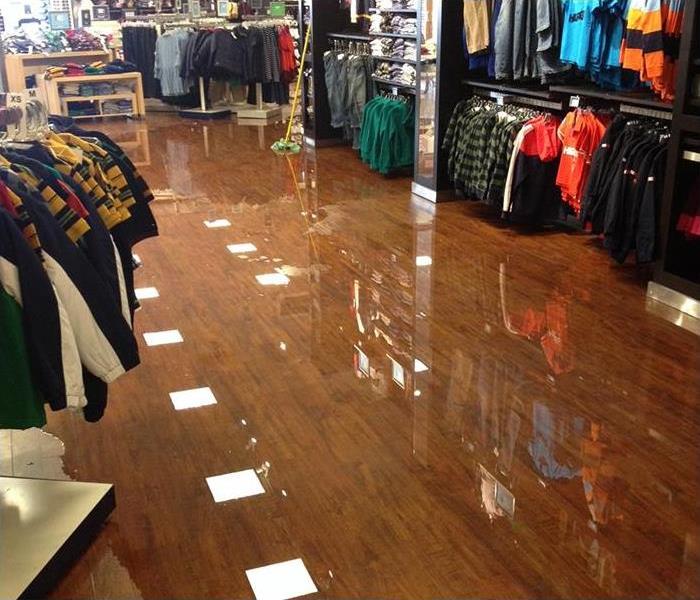 Choosing a professional restoration company is the fastest way of getting your retail store running again!
Choosing a professional restoration company is the fastest way of getting your retail store running again!
Running your own business comes with a handful of challenges that you seemingly regularly work to overcome. Natural disasters and unforeseen events occurring within the building of your business pose another threat that you cannot ever adequately prepare for, leaving you contending with varying degrees of damage to your Orlando retail store. In cases of even low-end water loss incidents, choosing the right professional assistance can make the process run much more smoothly.
The Advantage of Professional Restoration
Regardless of the cause of the water damage to your retail store, you instantly get preoccupied with how to restore the damage and get your store back to the way it was. Fortunately, when you choose the right professional restorers, this does not have to be the daunting task that it could have been.
As a business owner, you often get fixated on the cost of the work that needs to get done and how these unfortunate circumstances are going to affect profits in the months to come. While in many instances of water damage your doors have to be closed for a period to allow for restoration work to occur, the time it takes to do it yourself vs. professional restoration is rarely close. In fact, with the experience and equipment available to our SERVPRO professionals, restoration work often takes much less time than it could have for a business owner to work on the damage themselves.
Another critical thing to consider when choosing SERVPRO over any of the alternatives at your disposal is the quality of the work that we do. In instances of water damage throughout your retail store, lingering moisture and dampness from improper cleaning can allow for much more severe occurrences like mold and fungal growth in your store.
Choosing the Right Company
When water damage threatens your business, it does not just stop with the structure itself. All of the stock and contents of your business are at the mercy of this moisture and wetness, causing irreparable damages that can cost you even more. Trust in our SERVPRO of Winter Park technicians to respond rapidly and get right to work on correcting the situation you face. Give us a call anytime you require assistance at (407) 678-5391.
5 Things Your Commercial Carpet May Be Hiding
6/5/2018 (Permalink)
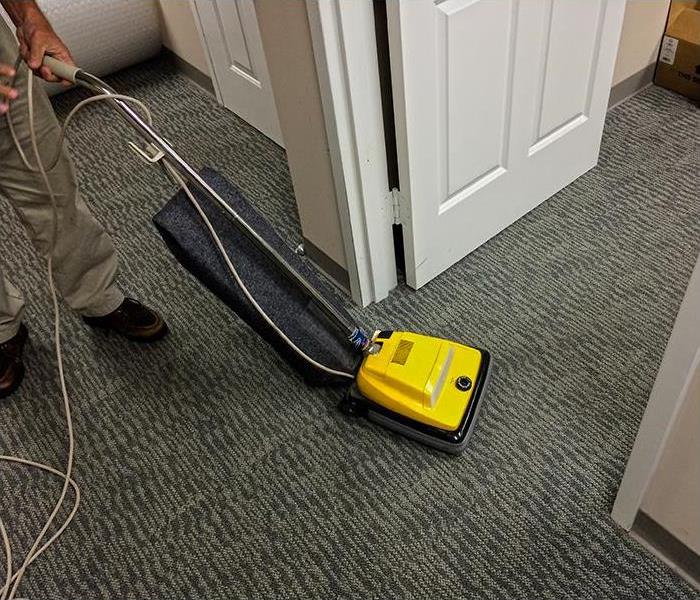 Vacuuming is helpful, however, it does not get rid of all problem-causing things hidden in your carpet.
Vacuuming is helpful, however, it does not get rid of all problem-causing things hidden in your carpet.
Let’s be honest, when there are no visible messes or stains on your carpet, hiring a professional carpet cleaning company is probably not on the top of your agenda. Most property managers or business owners will pass a vacuum quickly and call it a day. However, just because a large mess or stain is not seen, it does not necessarily mean that your carpet is clean or that it does not have potential underlying issues.
To show how important it is to have a professional carpet cleaning every so often, here are some of the problem-causing things that could potentially be lurking in your carpet:
Dirt and Dust
The average home in the U.S. builds up to 40 lbs. of dust per year, with potentially more in a commercial setting like an office. Dirt, dust, and sand typically gets stuck to the bottom of shoes and is spread throughout carpeting. Passing a vacuum eliminates approximately 85% of dirt and dust from a carpet, leaving a significant amount behind.
Food and Drinks
Many employees eat lunch and snacks while at their office desk. Stains and food accumulating on a carpet can be noticeable, however, a larger concern is the potential for bacteria growth and carpet odor as well.
Mold, Mildew, and Other Germs
Mold can easily go unnoticed and thrive while hidden under a carpet in a moist environment. A spill that was not dried quickly enough can lead to this hidden issue. Mold remediation can become a large expense if not covered by the right insurance policy. The best way to prevent these problems from happening is keeping your carpet clean and dry.
Skin Flakes
The average person sheds approximately 1 million skin flakes a day. When you think of how many employees work in your business, the duration of their shifts, and where those skin flakes go once shed, it’s easy to consider the amount that ends up in your carpet.
Bugs
Some bugs are easy to spot while others are not. Oftentimes, a carpet will serve as the perfect environment for microscopic bugs such as flees and dust mites. Many of these bugs actually feed on the skin flakes mentioned above and can be attracted by them. Another concern is allergies that can be caused by some of these bugs.
Professional Carpet Cleaning
We are not saying that vacuum should not be done in your commercial office setting, or that is not a great start. However, the problems mentioned above are common and can be more easily avoided by having your carpet deep cleaned at least once per year by a professional. If you would like to schedule a carpet cleaning for your commercial establishment, give SERVPRO of Winter Park a call at 407-678-5391!
Water Damage in Orlando Hotels and Resorts
5/26/2018 (Permalink)
 Many tourists cannot bear the Orlando heat and rely heavily on air conditioning units that can malfunction and lead to water damage.
Many tourists cannot bear the Orlando heat and rely heavily on air conditioning units that can malfunction and lead to water damage.
Orlando is one of the busiest tourist destinations in the world, making it prime real estate for many hotels and resorts. All year round, the city serves as the anchor for tourists going to various events, theme parks, and beaches. Therefore, it is crucial to ensure that your hotel or resort business consistently runs at its optimal levels. For many of your guests, the heat and humidity of Central Florida can be nearly impossible to bear so a room with air conditioning is extremely relied upon. It is common for these units to fail and unload a considerable amount of water. When this type of situation is not dealt with quickly and efficiently, it can cause a significant amount of damage.
Making a Bad Situation Worse
One mistake often made by management in these situations, is the assumption that a temporarily unrentable room is the extent of the problem. However, in most hotel or resort facilities, there are adjoining rooms and areas below the room that have a high chance of damage spreading and affecting even more guests. Delays in the proper removal of water and drying of all affected areas can quickly make the problem worse by introducing mold growth into the situation.
Commercial Water Restoration
In order to lessen the severity of your profit loss and prevent adjoining rooms and areas from being damaged, it is important to act quickly and find a professional restoration company that can have technicians onsite promptly. SERVPRO of Winter Park offers 24/7 emergency services and can help resolve your commercial water damage issues. We restore the damage by using water extraction equipment to remove all standing water and the majority of water that is soaked into carpeting. Afterward, the affected area is completely dried by strategically placed powerful air movers. Tests are also performed to determine the extent of the damage, how much restoration is necessary, and ensure that no moisture is left behind to prevent mold growth in your business and additional issues.
Trusted Restoration Company
Peak season or not, we strongly advise that water damage issues be taken care of quickly when they arise. If you have air conditioners in your Orlando hotel or resort that lead to water damage, give SERVPRO of Winter Park a call. We can be reached anytime at (407) 678-5391.
4 Commercial Water Damage Steps to Take After a Disaster
4/3/2018 (Permalink)
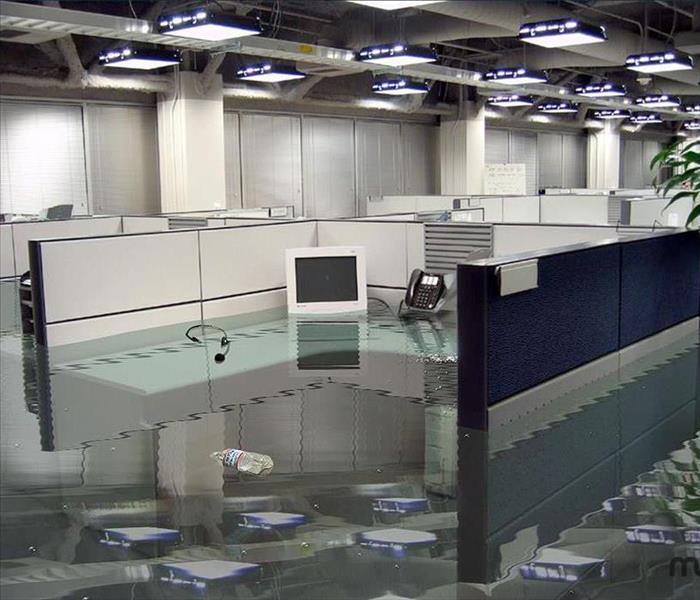 Protective shoes and gear can protect you from hidden hazards you can not see in the water.
Protective shoes and gear can protect you from hidden hazards you can not see in the water.
Hopefully, you never experience a major commercial water damage disaster in your business. With that being said, it is critical to know how to handle a water damage situation before it happens so you are adequately prepared if it does. Flooding can cause a variety of issues including structural damage. As a business owner, you can avoid additional disasters by ensuring the following steps are taken immediately after water damage occurs.
1. Protect Yourself
The safety of you and your employees should be your first priority. Make sure to never put your hands anywhere you cannot see first. Wearing sturdy shoes when walking in flood waters can protect your feet from hidden debris in the water that can trip or cut you. Flood waters can be contaminated so wearing hip waders is also a good idea. Look out for snakes or other creatures that may have been displaced by the flood.
If you are unsure or concerned about your safety at any point in time, remain outside of the property and wait for your restoration company to arrive. They will know all of the procedures and safety precautions to take in order to keep themselves and others safe.They will also have protective gear to wear as they are assessing the situation.
2. Shut Off Potential Hazards
If it is safe to do so, you will want to make sure that you turn off any electricity to the affected areas. You don’t, however, want them to be turned on before you are ready. Doing so can potentially mix electricity and water or create a gas leak before the flood damage can be corrected.
Your restoration company will have access to special tools that can detect moisture. This is key to ensuring the property is completely dried out and preventing any mold from growing. For example, a digital moisture meter is able to find signs of moisture behind walls
3. Take Plenty of Photos
For insurance purposes, it is a great idea to be as thorough as possible when documenting the water damage in your property. Taking lots of pictures will help you when filing a claim with your insurance company. Get photographic evidence of the damage that was left behind by the water, plus any water that is still there. Document all that you can and then speak with your insurance company as quickly as you can to get the claims process going.
4. Salvage What you Can
Keep in mind that it is extremely common for any property affected by a water disaster to experience mold growth. Mold only needs about twenty-four to forty-eight hours to start growing. Drying out the entire property as fast as possible is essential to preventing it from doing so.
The professional restoration company can assist you in this, but you will need to throw away anything that has been saturated for over forty-eight hours and figure out on a case to case basis what else can be saved or needs to be thrown away. Rugs and padding will always need to be tossed if they are damaged by flood waters.
5 Ways Commercial Restoration is Different from Residential
2/28/2018 (Permalink)
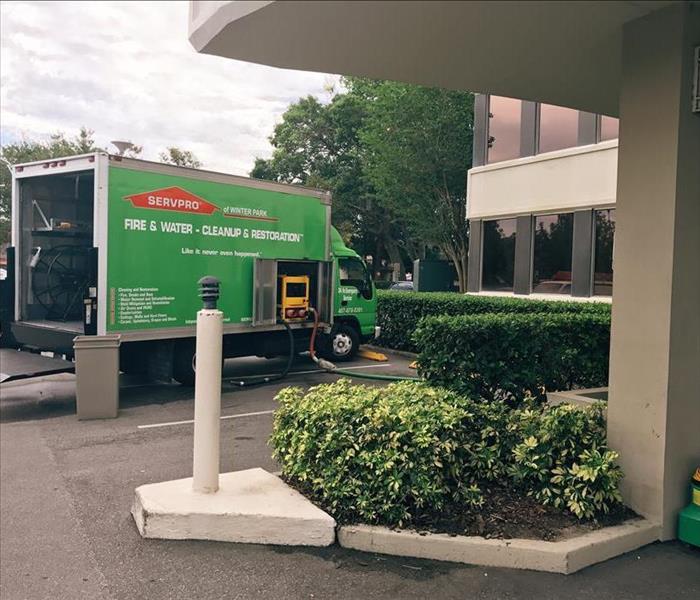 Commercial restoration jobs typically require more equipment on-site due to larger affected areas.
Commercial restoration jobs typically require more equipment on-site due to larger affected areas.
There are many ways that a commercial restoration job can be different from a residential job. Today, we share our five most important differences. Whether the job involves water, fire, or mold, knowing what to expect as a commercial client can go a long way for your restoration process and experience.
1. Size of the Area Requiring Services
The most common difference between a commercial job is the size of the area that requires services. The actual size varies from job-to-job based on several factors. For example, a pipe burst on an upper floor of a building can affect the lower floors and cause damage that may not even be visible. On the other hand, a mold removal job in the ballroom of a hotel would require the entire room being sealed and contained.
2. Additional Furniture and Objects
With larger affected areas, usually comes a higher amount of furniture and objects that must be removed. These objects can include filing cabinets, desks, various types of machinery and more. To properly dry carpets these items should be removed. In cases where objects cannot be moved, the restoration company must work around them, making the process trickier.
3. Different Specifications
Buildings are oftentimes built with different specifications and can cause delays or complications of the restoration process. During the process of cleaning water, additional challenges can include removing excess water and even testing for dryness levels. If a commercial unit has firewalls, drywall could be twice as thick making it more difficult to locate and extract wet insulation.
4. Multiple Insurance Claims
Another difference comes in the form of insurance claims. Aside from the claim itself being larger in most commercial cases, clients such as apartment property managers can have multiple residents and their belongings affected. This can lead to the need for multiple individual insurance claims being filed. More claims mean more claim handlers in need of continual job updates along with the tenants and property manager.
5. Open Business Hours
An important factor to consider in a commercial job is if the business will continue to operate on-site during the restoration process. Many businesses cannot afford to cease operations during this time. In these cases, the restoration company should be mindful of working employees by keeping noise to a minimum and even creating accessible walkways and work areas. For mold removal jobs, all parties must understand the importance of keeping contained areas sealed. Clear communication between the restoration professionals, clients, and their employees can make all the difference in these situations.
Best Commercial Restoration Company
The 5 differences between residential and commercial restoration listed above show just how important it is to choose a company that knows what they are doing and what to expect. SERVPRO of Winter Park is available 24/7 to respond to your emergency restoration call. Our highly trained professionals understand what it takes to get the job done right. We are Faster to Any Size Disaster and even have a warehouse that can store your business’s belongings. Give us a call at 407-678-5391 and get started today!
Commercial Water Damage Resolved By SERVPRO
9/29/2016 (Permalink)
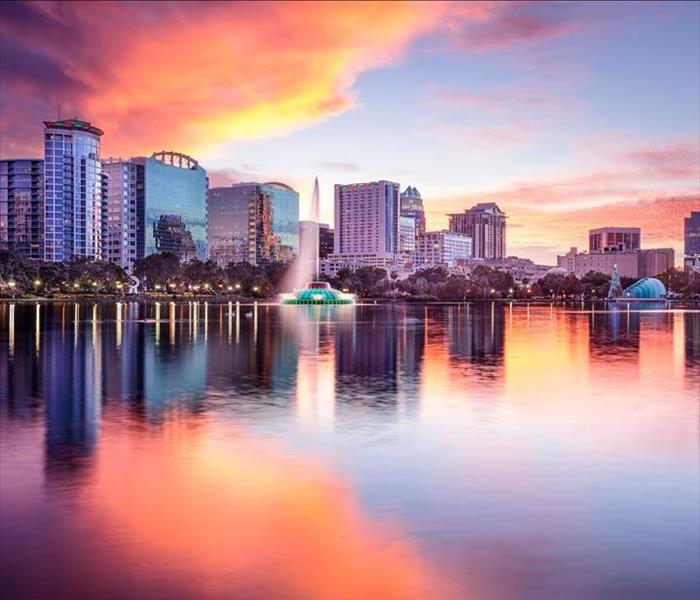 Orlando Water Damage Gets Help from SERVPRO
Orlando Water Damage Gets Help from SERVPRO
With the Help of SERVPRO, Businesses Reopen Faster After Water Damage
After a water emergency strikes in a commercial building, you own your immediate concerns involve both personal losses along with the added stress and responsibility to get all of your tenants back in business or living comfortably in your units again. SERVPRO offers the resources locally and on a national level to rehabilitate even a complex commercial water damage scenario. We exceed your needs both to repair your property and also to restore the trust the companies and individuals have invested in your professional commercial management.
Although burst pipes or a roof leak may start in a confined area of your office building, apartment complex or warehouse space, the resultant flood and seepage of water can spread far from the original breach. Many if not all of the businesses or residents renting from you are in peril of losing personal and professional property as well as their means to make a living if you do not take immediate steps to solve your Orlando commercial water damage. Even if the water overflow can be traced to the negligence of a tenant, you as the owner are charged with the task of protecting your building and fixtures and ensuring that all those who live in or operate a business within your commercial property have the use and quiet enjoyment of their leased premises quickly restored.
SERVPRO understands how important it is to limit the downtime of your and your tenants’ business operations. We make every effort to clean and dry the structure quickly, staging the restoration process with an eye to reestablishing business operations even before the entire remediation is accomplished if appropriate and safe. Preventing secondary damage from contaminated water is a major goal, made more attainable if we are involved as soon as possible in the process. Our services for you and your tenants can also include a pack out and detailed inventory of documents soaked by the water. We follow up with our state of the art procedures for saving and drying paperwork, books, pictures and other crucial work products you and your lessees may have feared would be lost due to the water infiltration.
If your commercial property has suffered water damage, call SERVPRO of Winter Park immediately. We can be reached at (407) 678-5391 24 hours a day every single day of the year, our technicians eager to return you and your renters to business as usual swiftly
What to Do After a Commercial Fire Damage Emergency
8/31/2016 (Permalink)
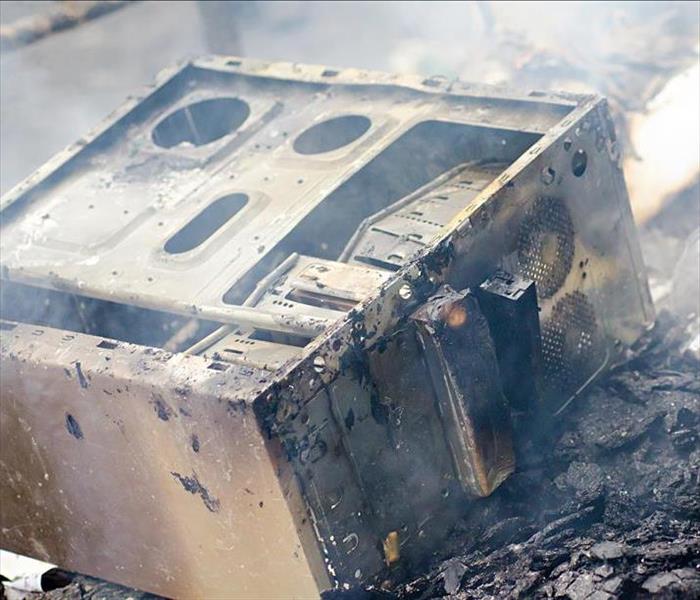 Fire Damage in an Orlando Office Gets Restored by SERVPRO
Fire Damage in an Orlando Office Gets Restored by SERVPRO
After Flames Close Your Business, Call SERVPRO for Fire Damage Restoration
Thousands of businesses are affected by commercial fire damage each year due to a wide range of causes. Whether it's a restaurant that encounters a fire, an office in a building that was affected by a nearby disaster, or a severe storm that sparks flames, such an event is never easy to deal with.
Few proprietors are prepared to grapple with the aftermath of a fire because it's not something that most business owners expect will happen to them. Entrepreneurs who suffer commercial fire damage in Orlando may feel at a loss when it comes to picking up the pieces and resuming business as usual. Here are three key steps you should consider taking after a fire has shut down your business.
1. Get in contact with your insurance company right away.
Not only will this be one of the most relevant steps to getting back open and serving your customers, but also your insurance company will provide the funds needed to make repairs to your business. We know how to navigate the commercial claims process, and any repairs that we complete will meet or exceed your insurance provider's requirements.We do emphasize that we are not an insurance company.
2. Secure the remaining equipment and property in your building.
Unfortunately, commercial fire damage increases the likelihood of vandalism and theft, as your building will be left vulnerable and less secure. Patching up walls, doors, and windows, even temporarily, can go a long way towards preventing further problems. The experts at SERVPRO have the experience and tools needed to secure your business's exterior and interior quickly. As a result, your property will be safeguarded, and any further damage to the building will be minimized.
3. Be mindful of smoke damage.
Even if it appears that your business was only minimally affected by commercial fire damage, the building likely has lingering smoke that will destroy your equipment, documents, and inventory over time. When you call SERVPRO, we'll thoroughly inspect your business for smoke damage and effectively clean it up, eliminate odors and restore satisfactory indoor air quality.
The team at SERVPRO of Winter Park knows how devastating commercial fire damage can be, and we're committed to helping you get your business back up and running. To obtain a quote or get more information about our fire repair and restoration services, call us 24/7 at (407) 678-5391.
What to Do if You Have Downtown Orlando Commercial Water Damage
5/31/2016 (Permalink)
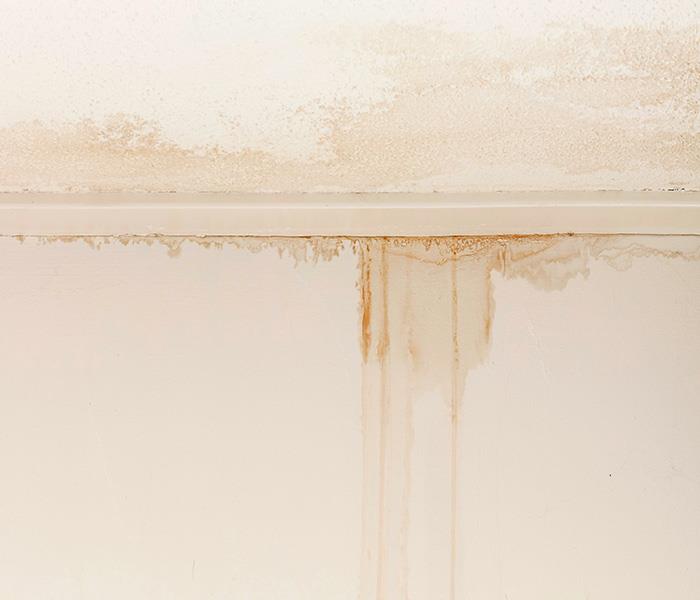 Commercial water damage in downtown Orlando can be devastating for any business owner.
Commercial water damage in downtown Orlando can be devastating for any business owner.
Getting Help With Water Remediation Service in Downtown Orlando
Floods can occur in downtown offices, retail and other commercial spaces for a number of reasons. For example, a flood may develop after a heavy rainstorm, a plumbing issue or for other reasons. If you are dealing with a flood on your property, you may want to restore the property as quickly as possible. Your urgency may be to continue business as usual. If you have downtown Orlando commercial water damage, you may be wondering how to respond to the situation that you are facing.
Turn off the Water Supply
If your downtown Orlando commercial water issue is the result of a plumbing problem, the first step that you should take is to stop the flow of water into the property. You can do this by turning off the main water valve that supplies the broken pipe with water. In some cases, this may be the main water supply to the entire building or a localized valve to a particular section of the plumbing. You can also call a plumber to repair the pipes for you as soon as possible so that you can once again turn the water valves back on.
Remove the Water
Immediately after you take these steps, you will need to begin working on removing the standing water from the property. You should not start the water extraction process yourself but contact a professional downtown Orlando commercial water remediation service. Professionals will use extraction equipment to remove the standing water quickly from the smallest spaces. Keep in mind that it is important to remove the water as soon as possible so that the potential for additional damage is kept to a minimum.
Dry out the Property
You may think that the property is dried out after the standing water has been removed, but this is not necessarily the case. The reality is that the air, drywall, and other surfaces may still be moist. Additional efforts must be taken to return humidity levels to normal and restore the condition of the home as much as possible. Professional remediation services use powerful fans to dry out the air and the surfaces in the home so that they are returned to normal. After this, the property can be restored through construction or other methods.
Call for Professional Assistance
Restoring a property after a flood is not a matter to take lightly, and you may understandably want to restore the property as quickly as possible. SERVPRO of Winter Park is the water extraction and remediation company to call for fast results. We are a local company that is ready to respond to requests for service without delay. You can reach us today for assistance with your property by calling (407) 678-5391.
 Here you can see the destruction caused by a large commercial fire. With this extent of damage, it is extremely important you hire an expert company.
Here you can see the destruction caused by a large commercial fire. With this extent of damage, it is extremely important you hire an expert company.





 24/7 Emergency Service
24/7 Emergency Service


























